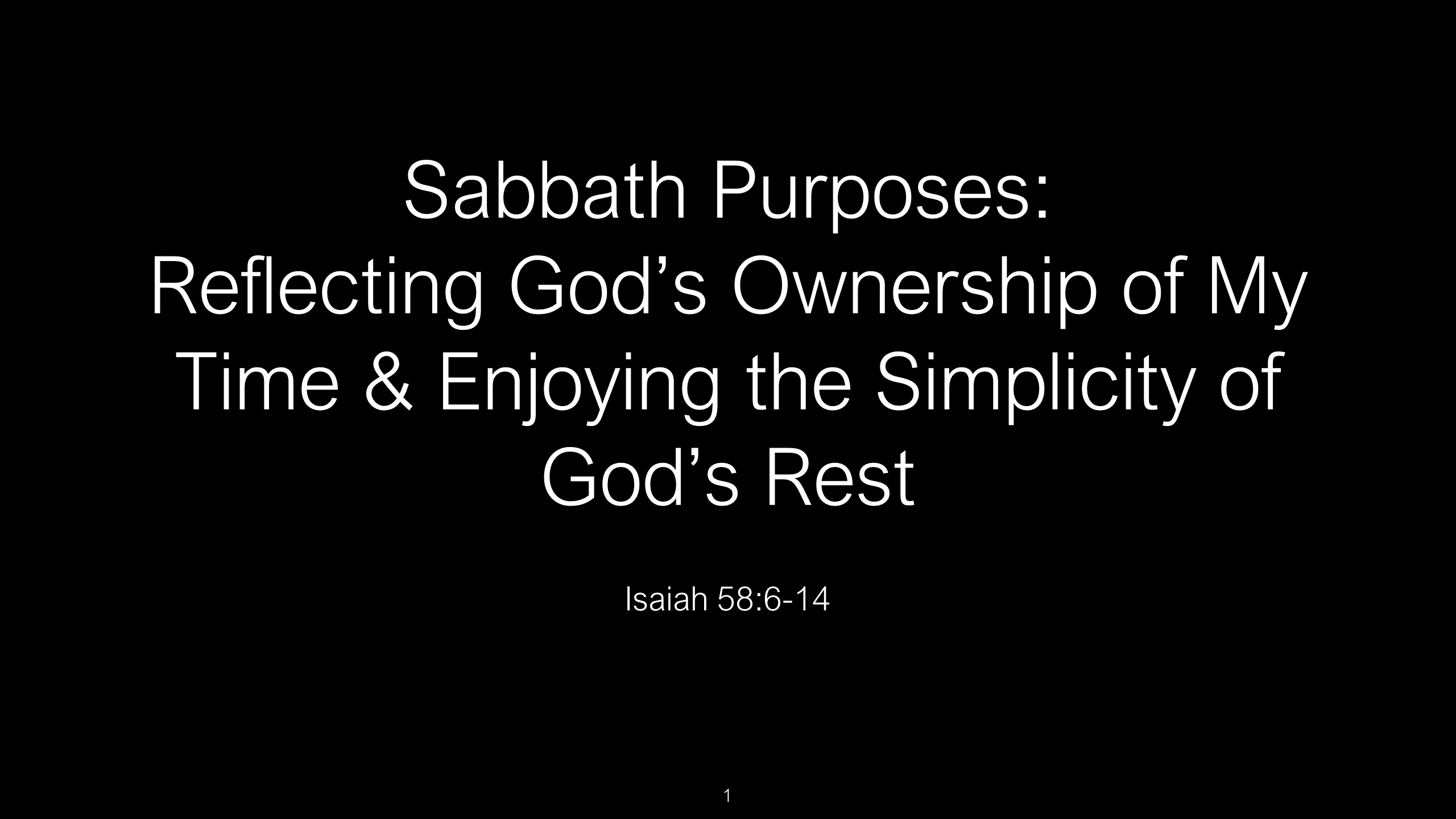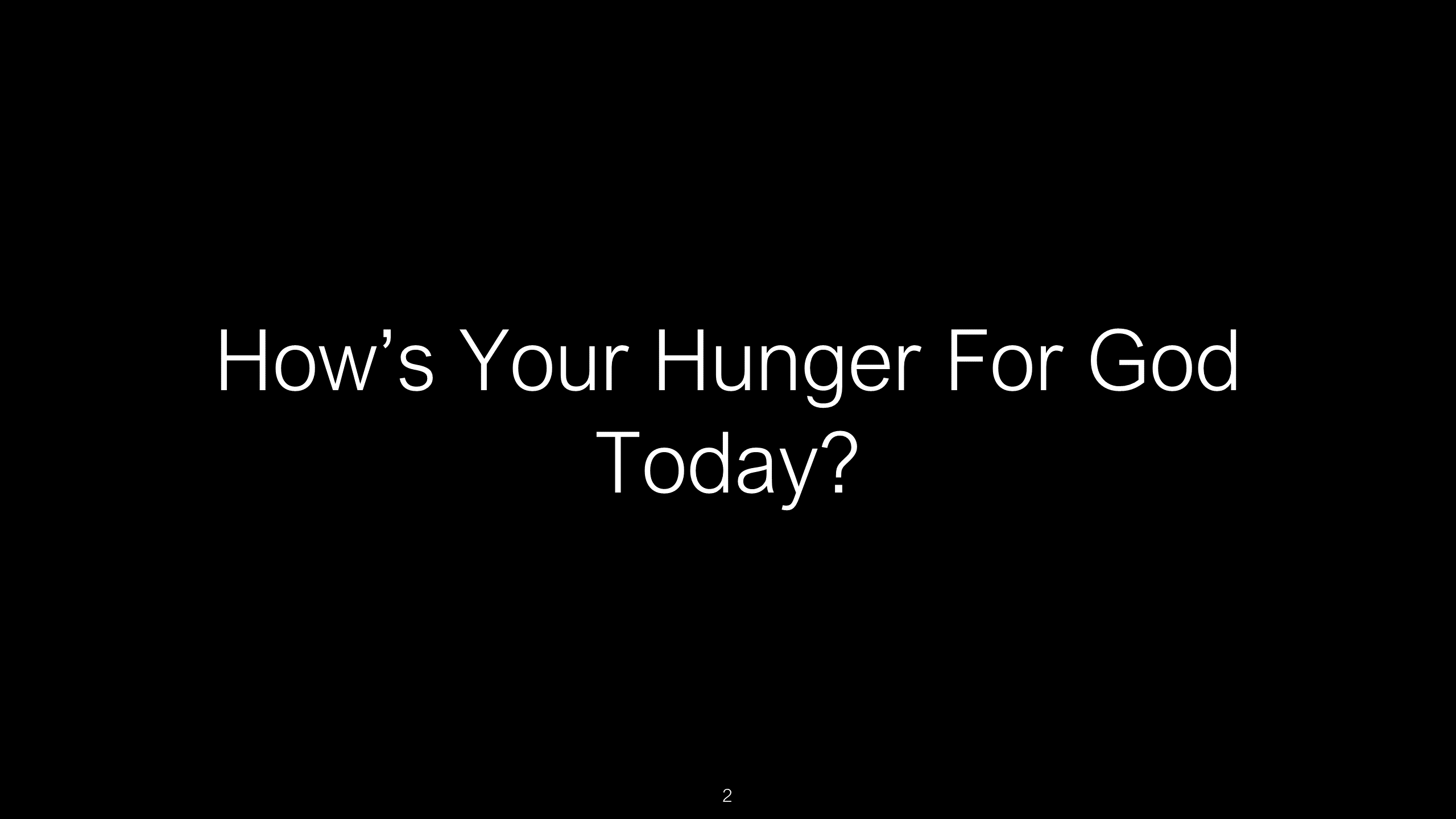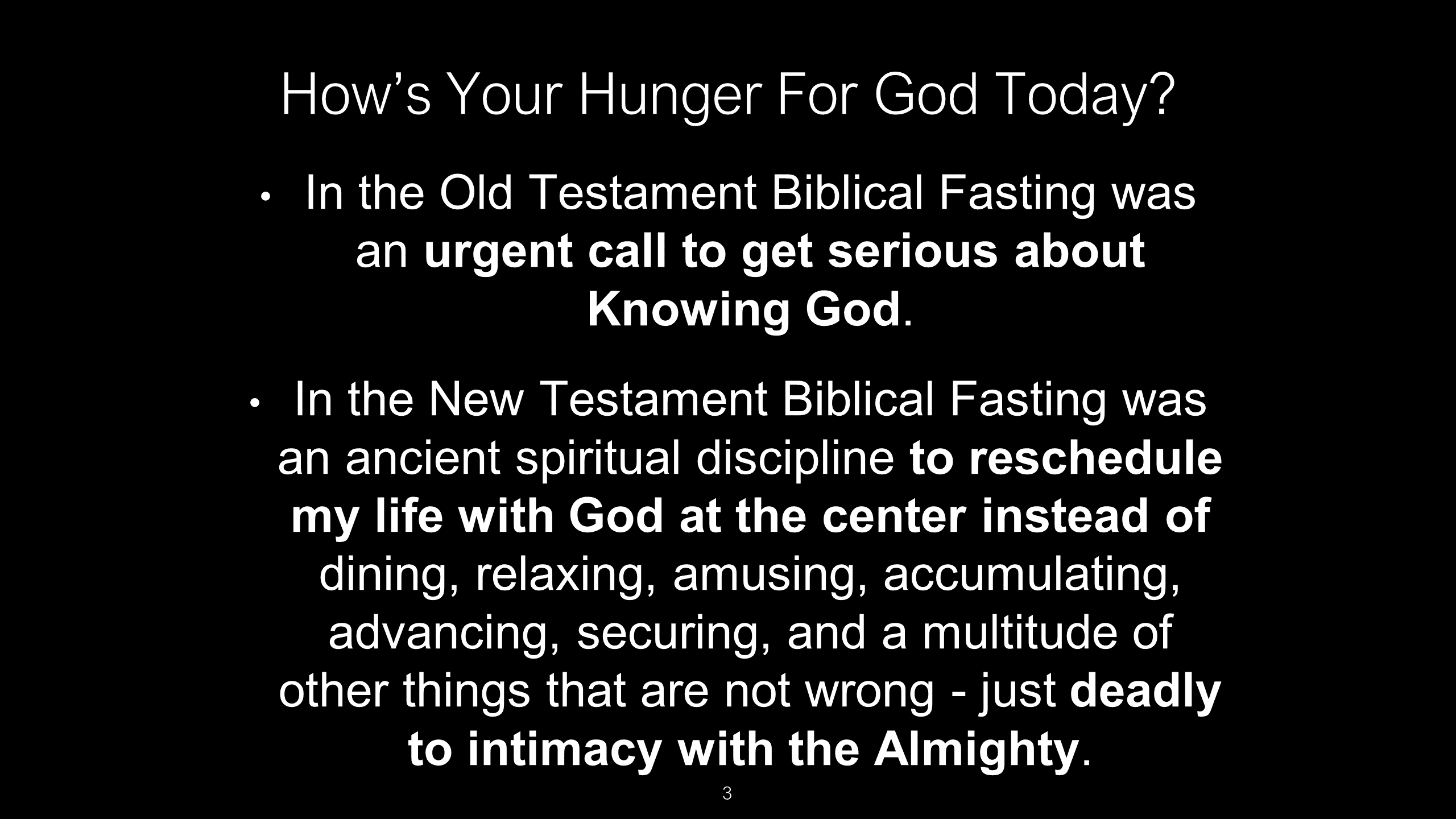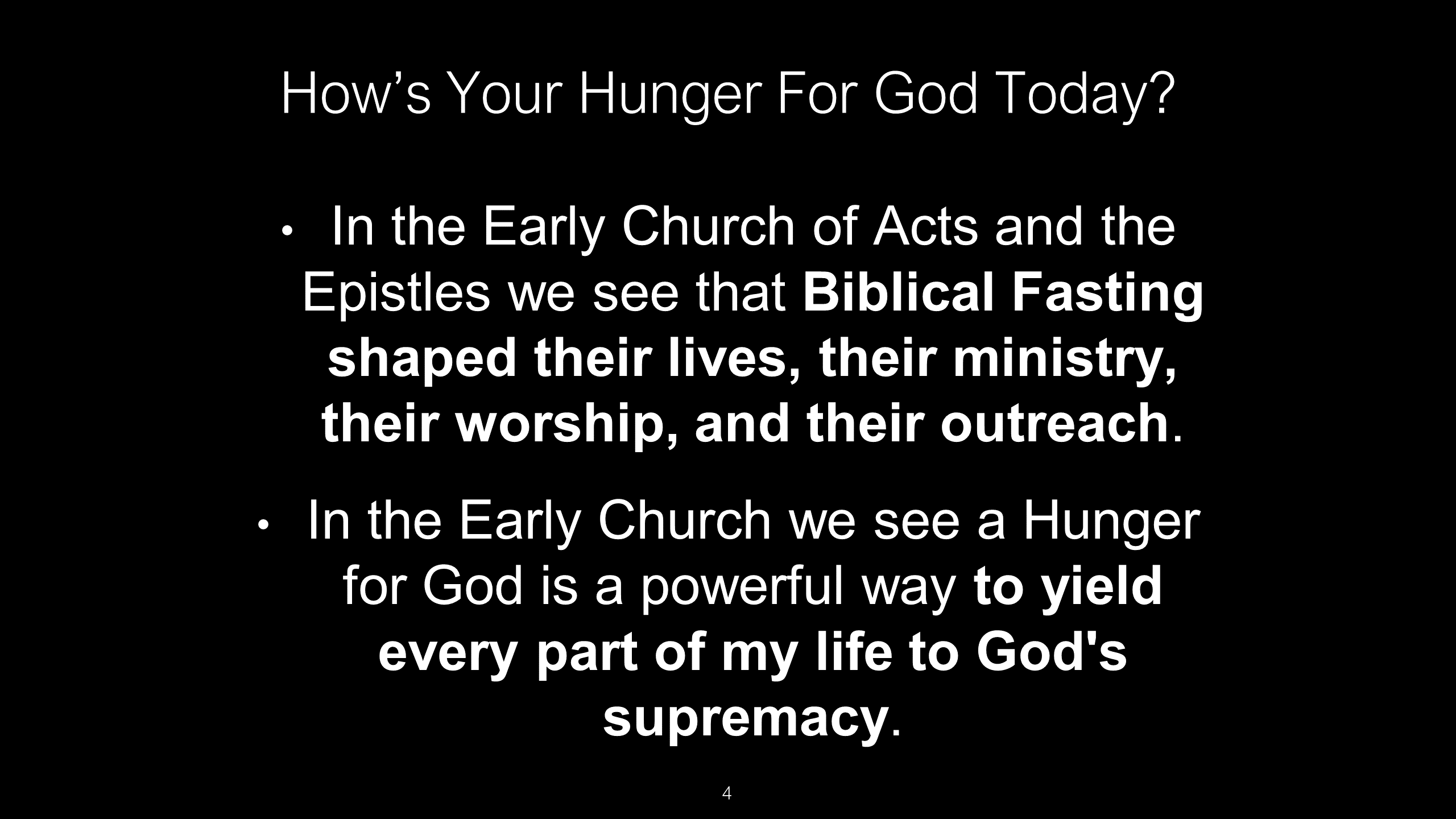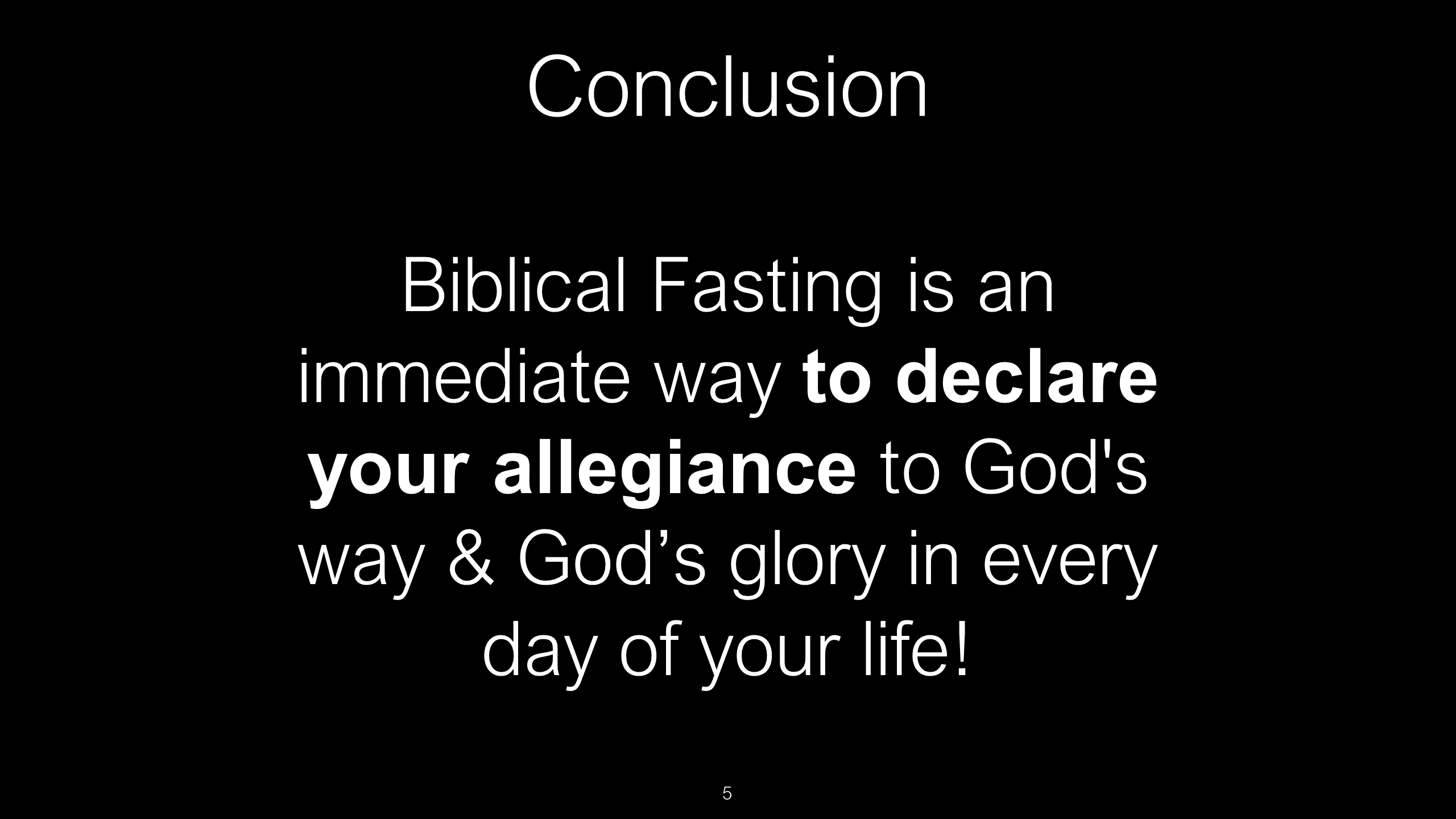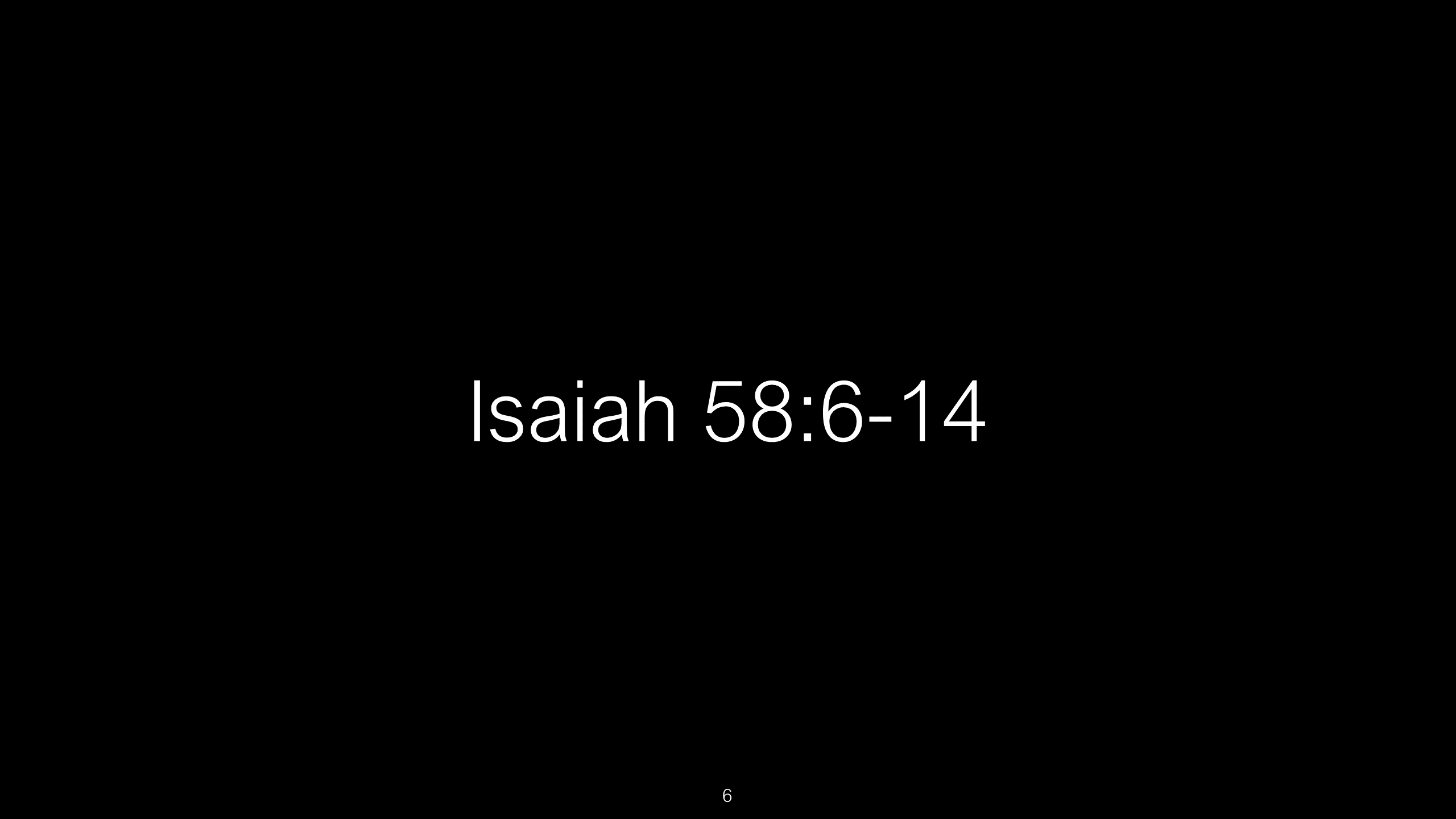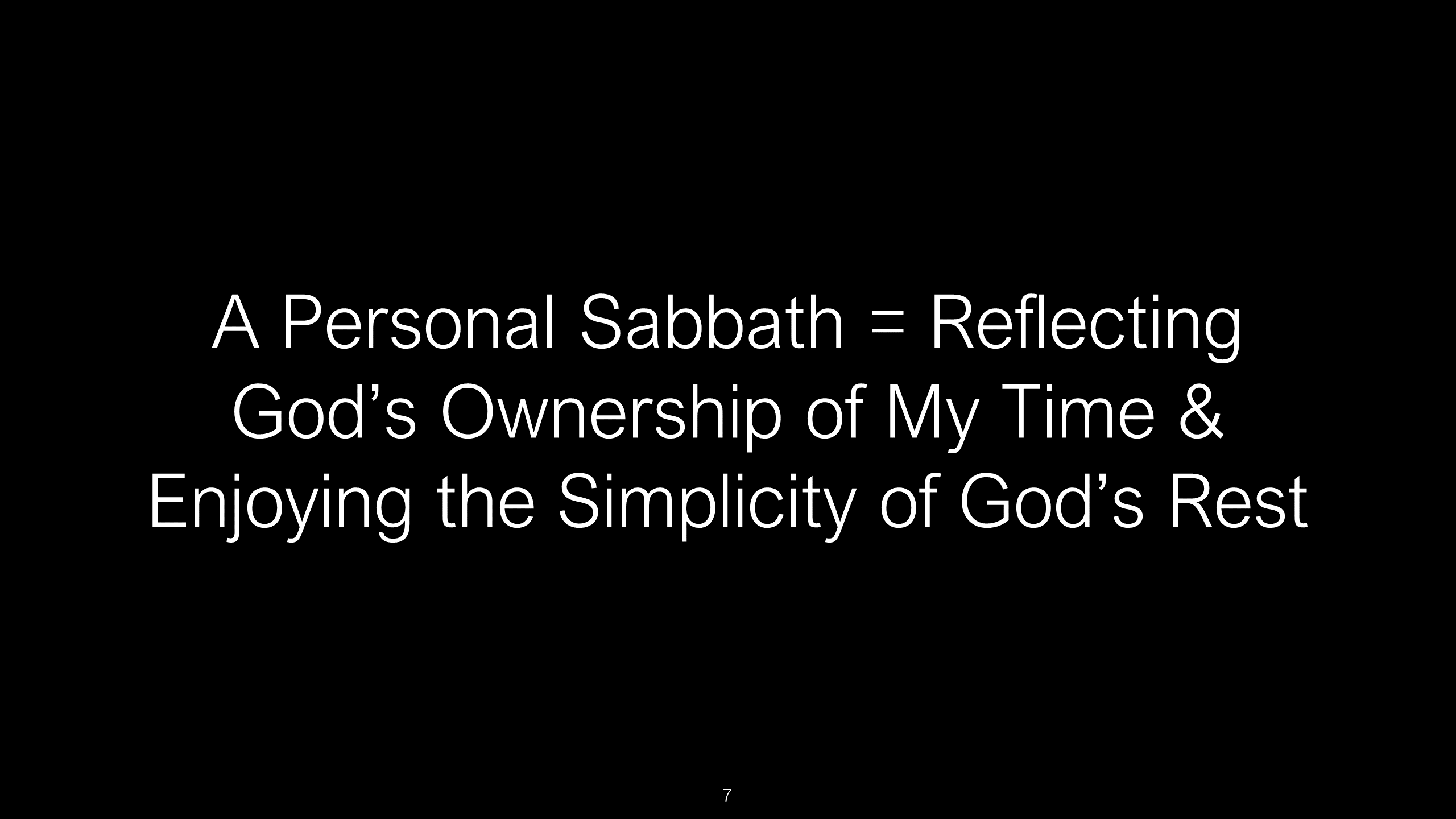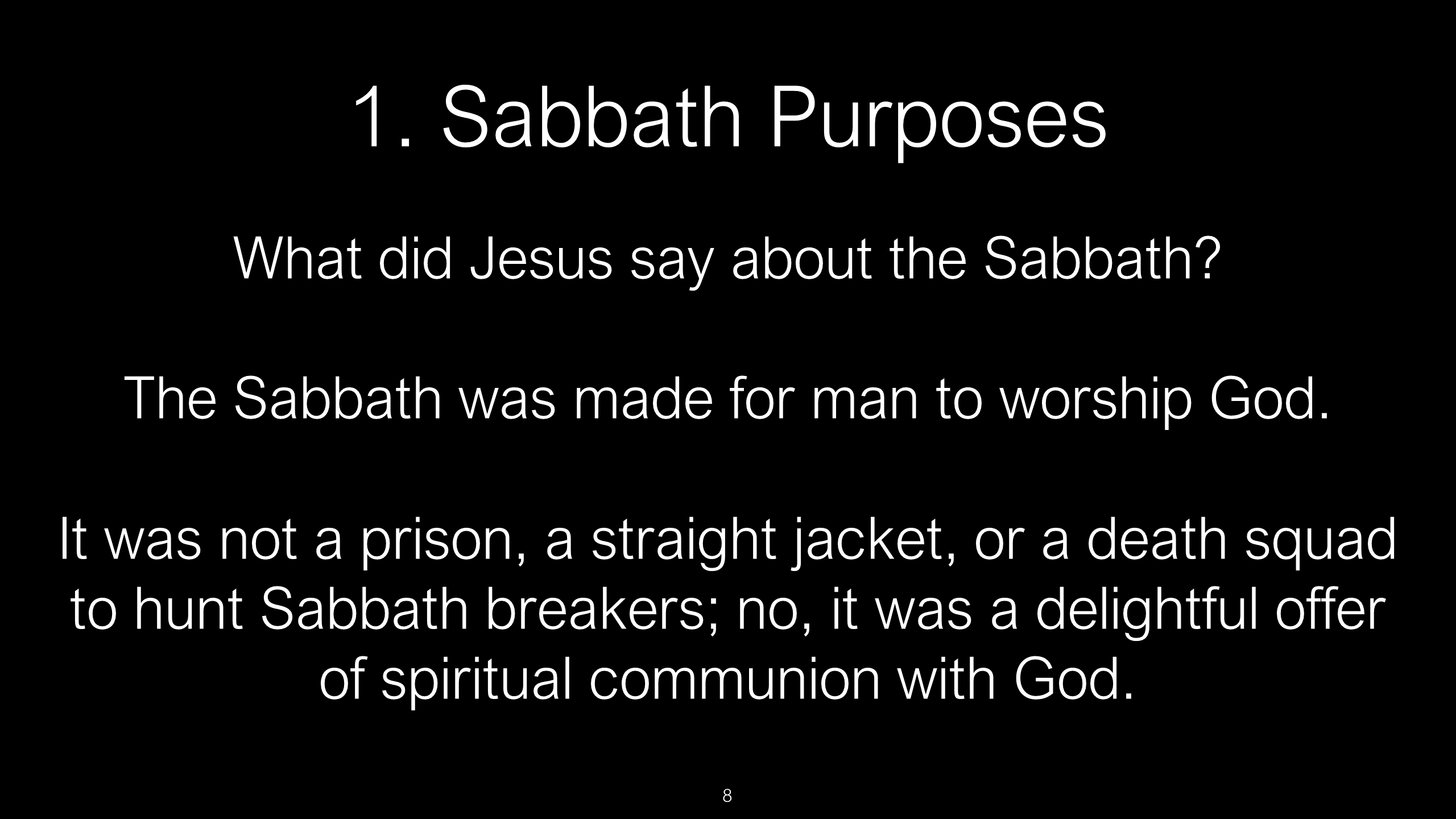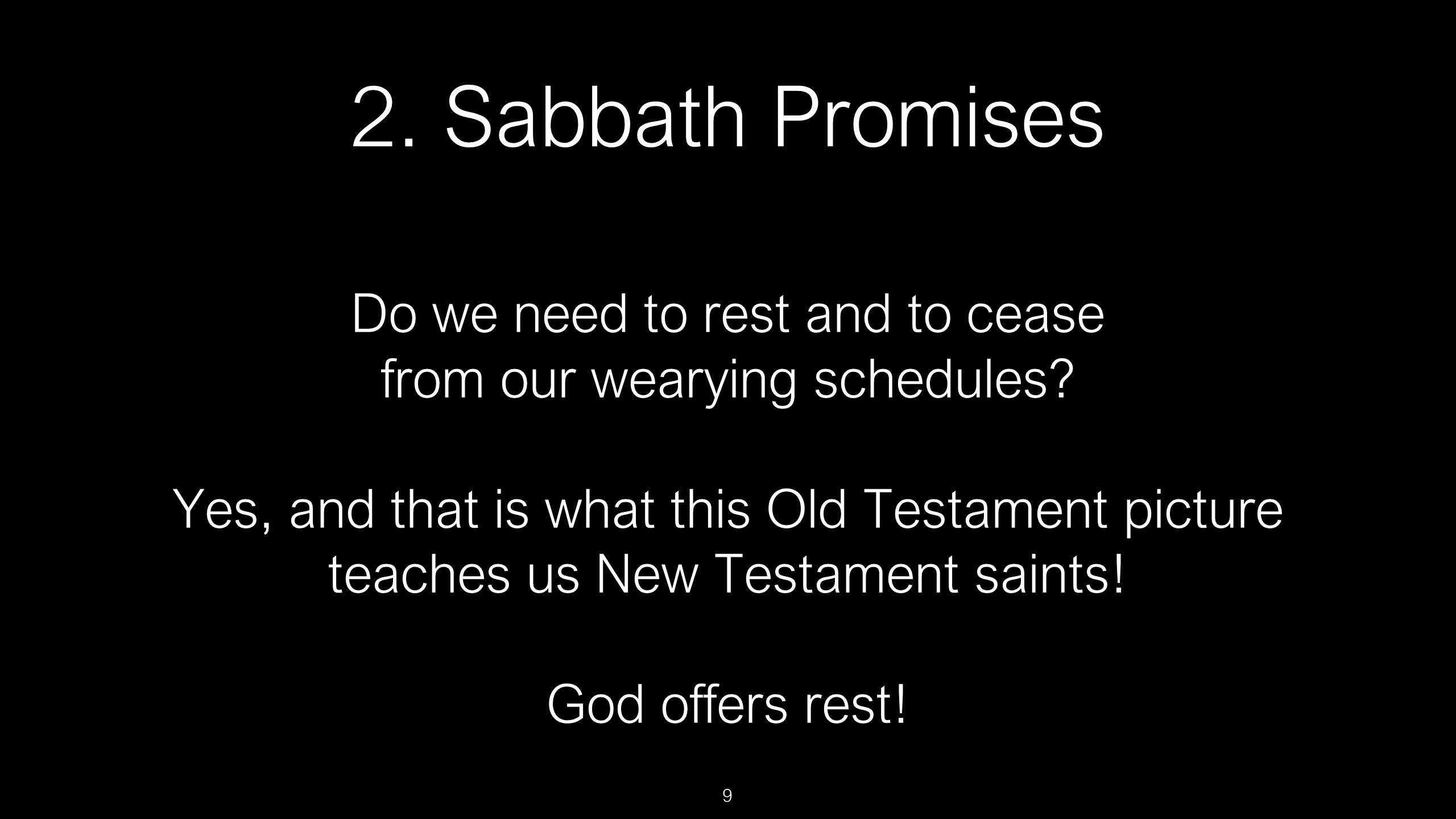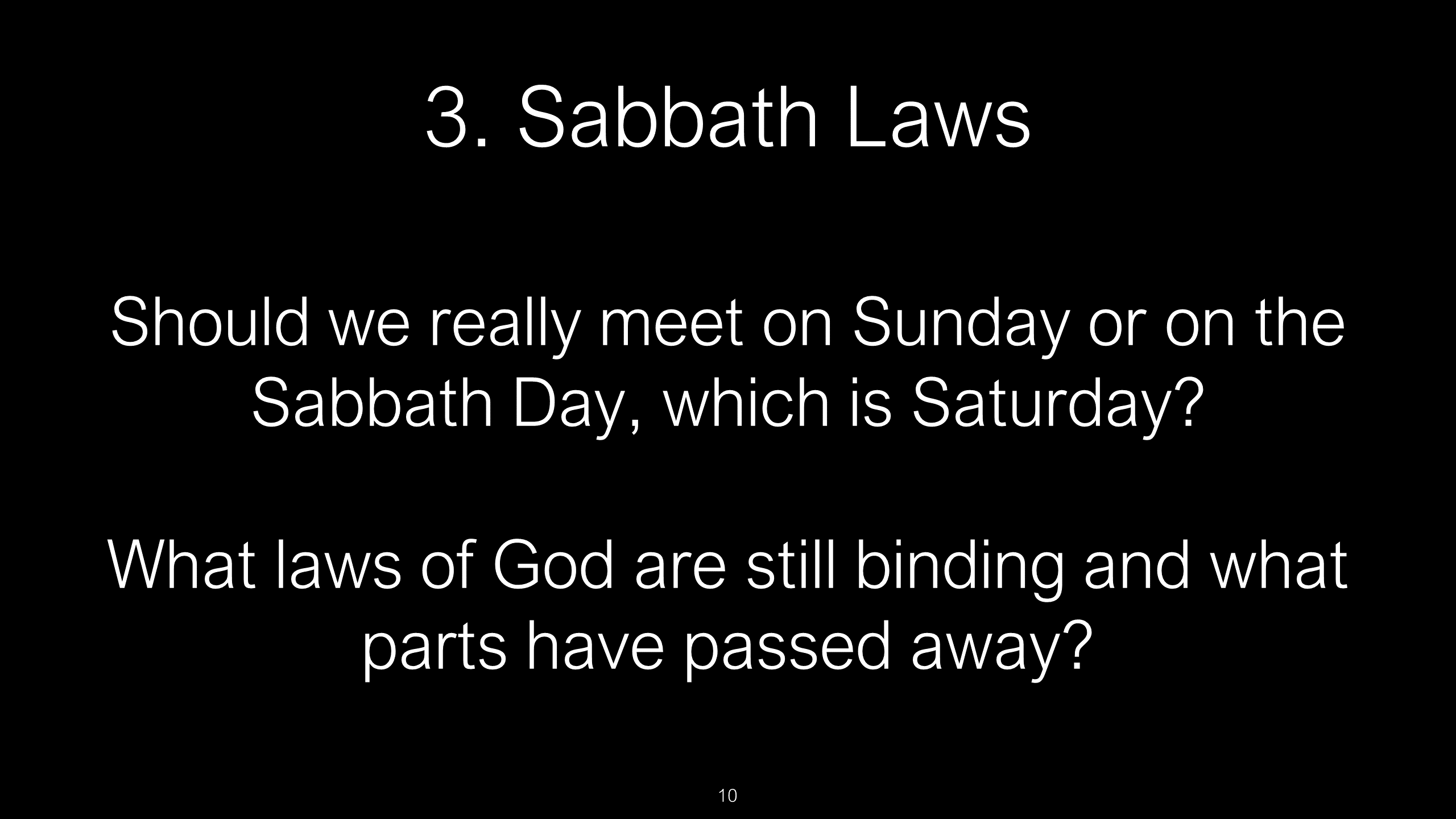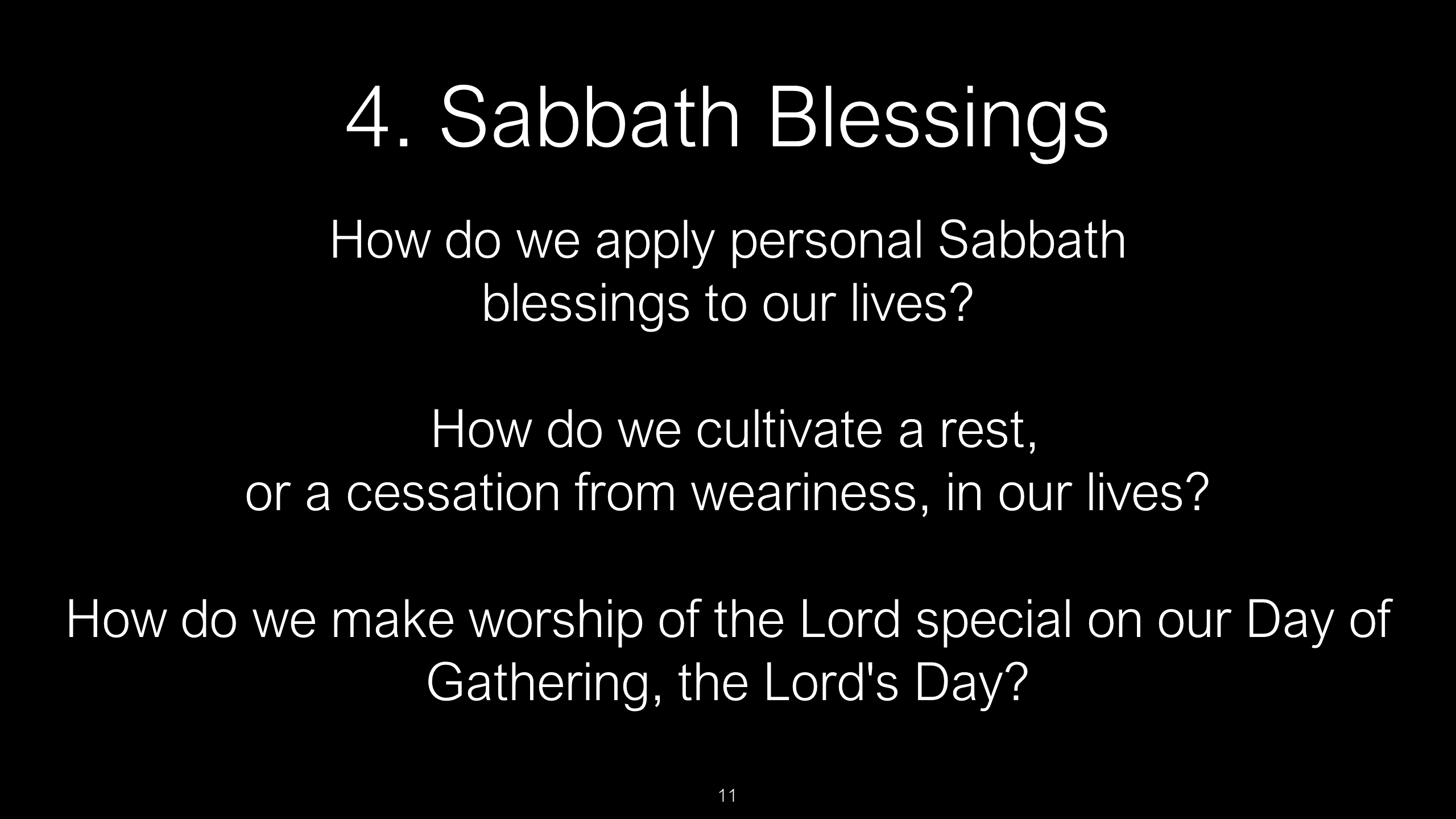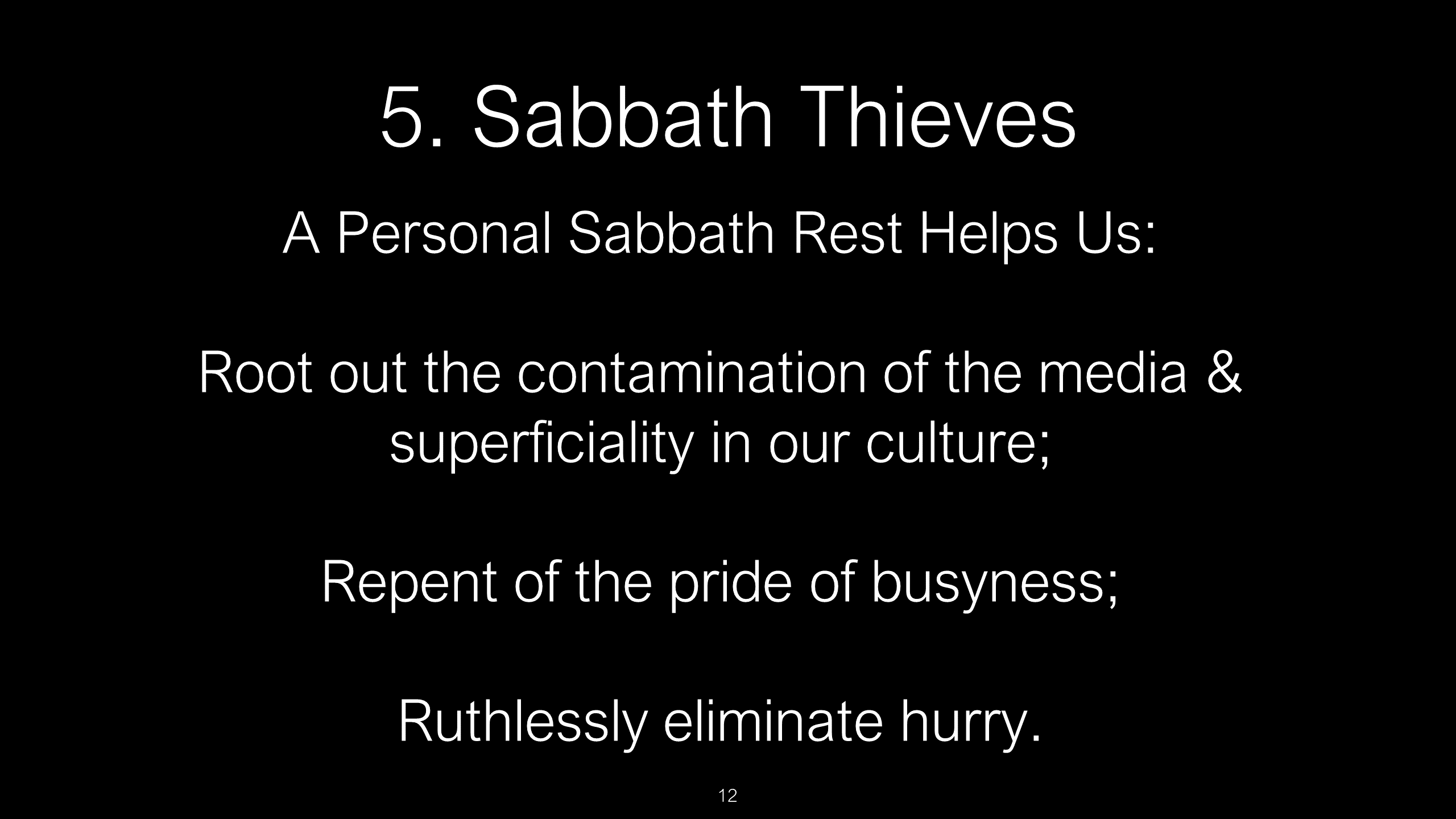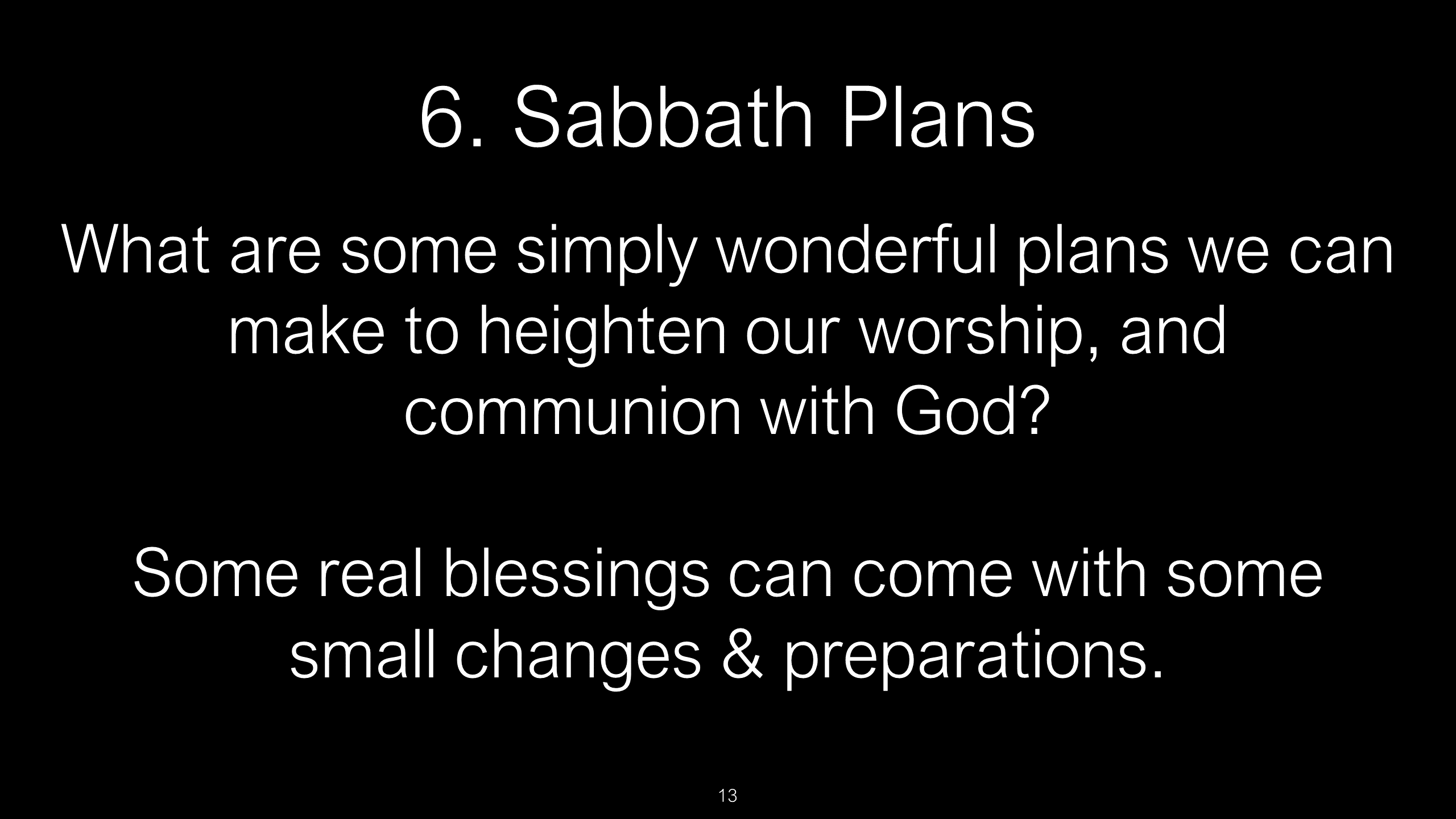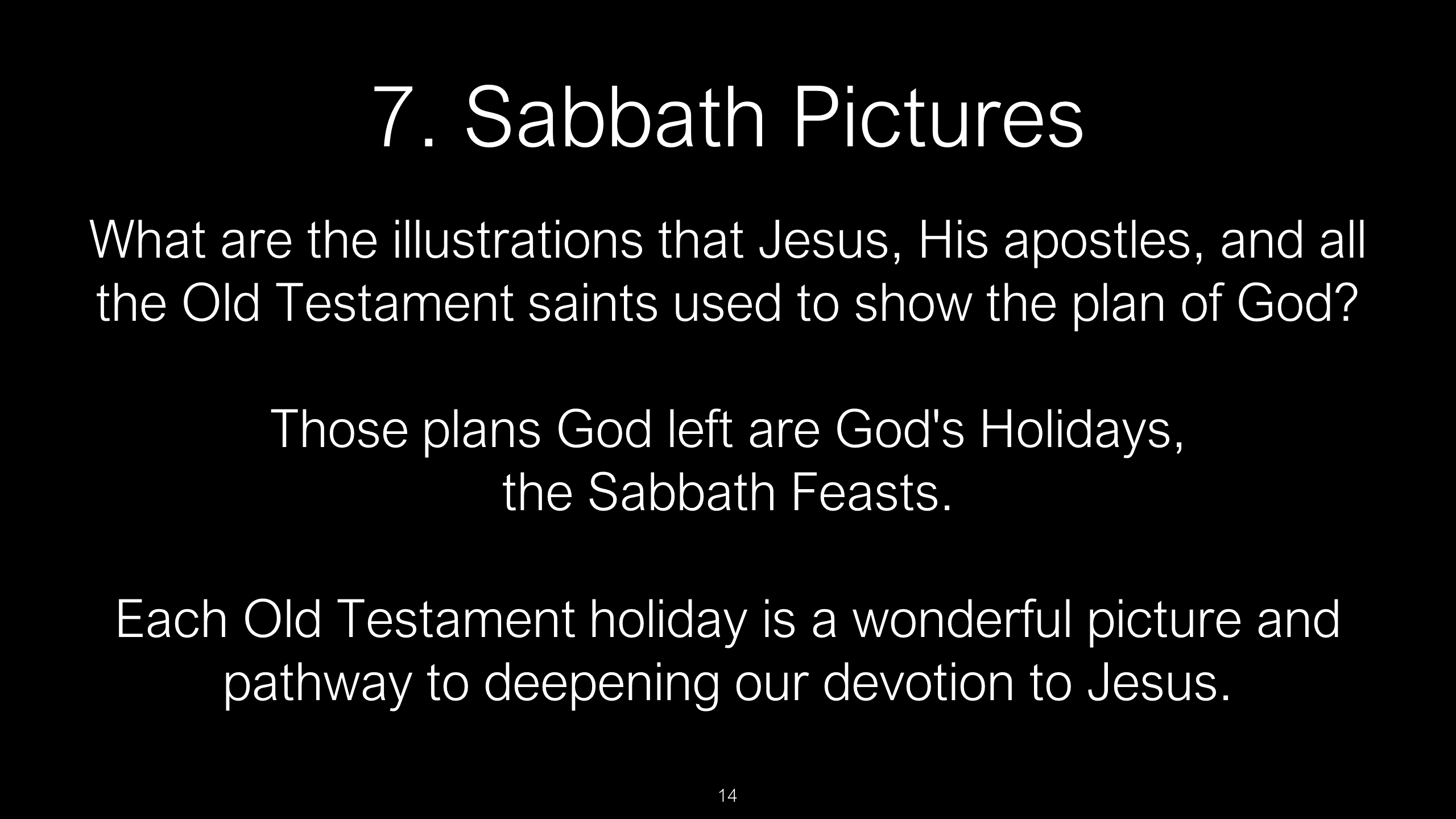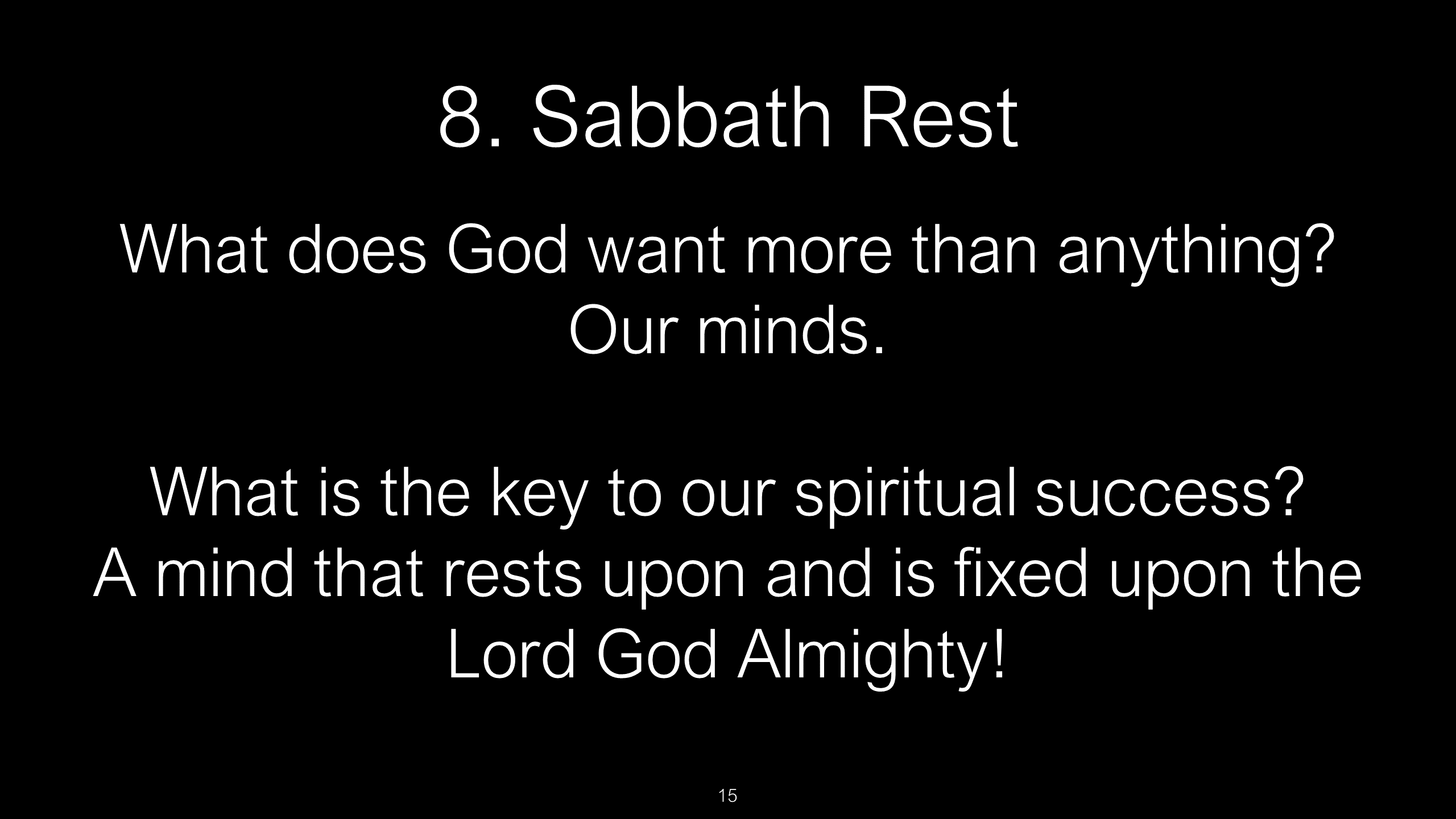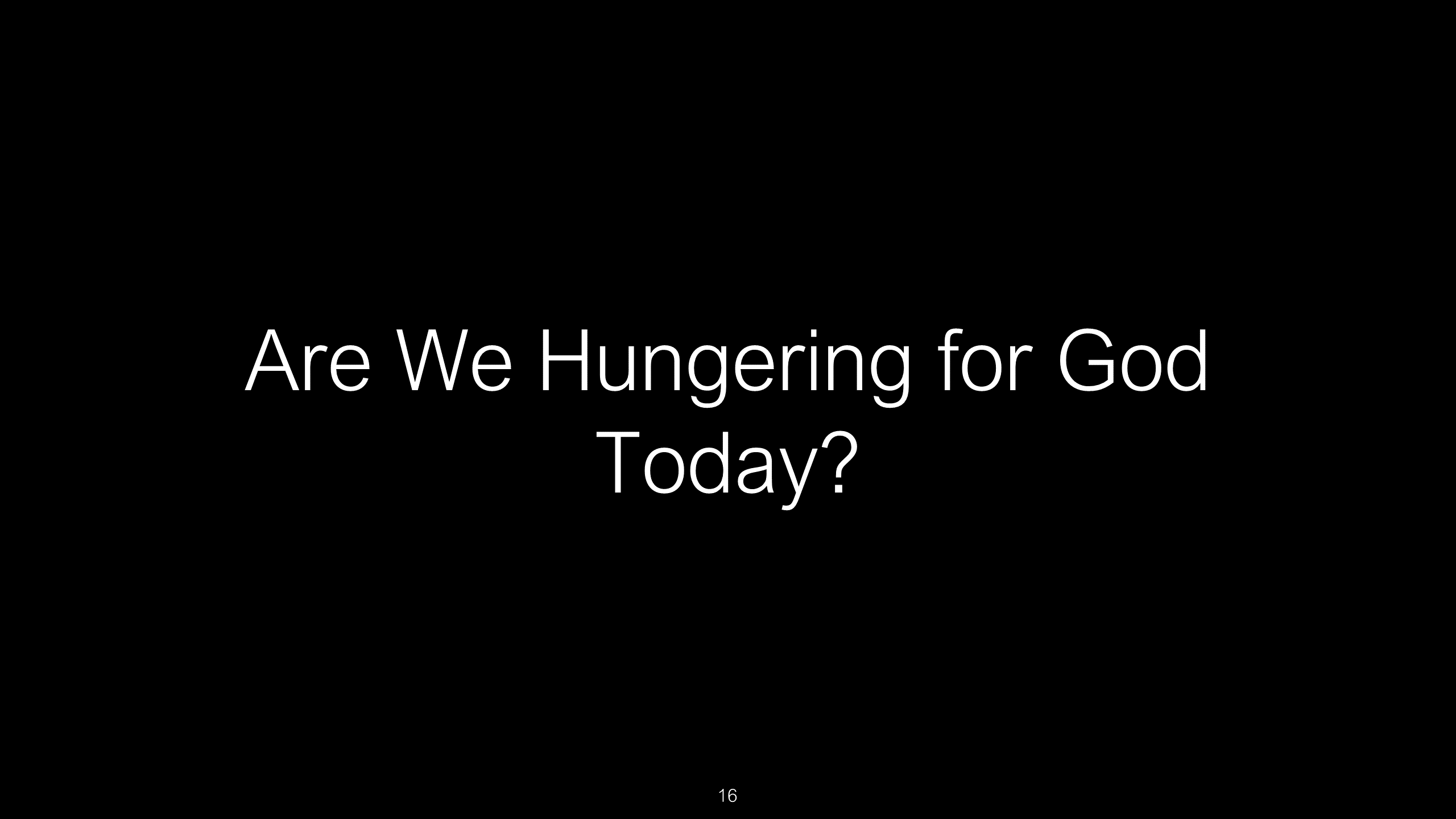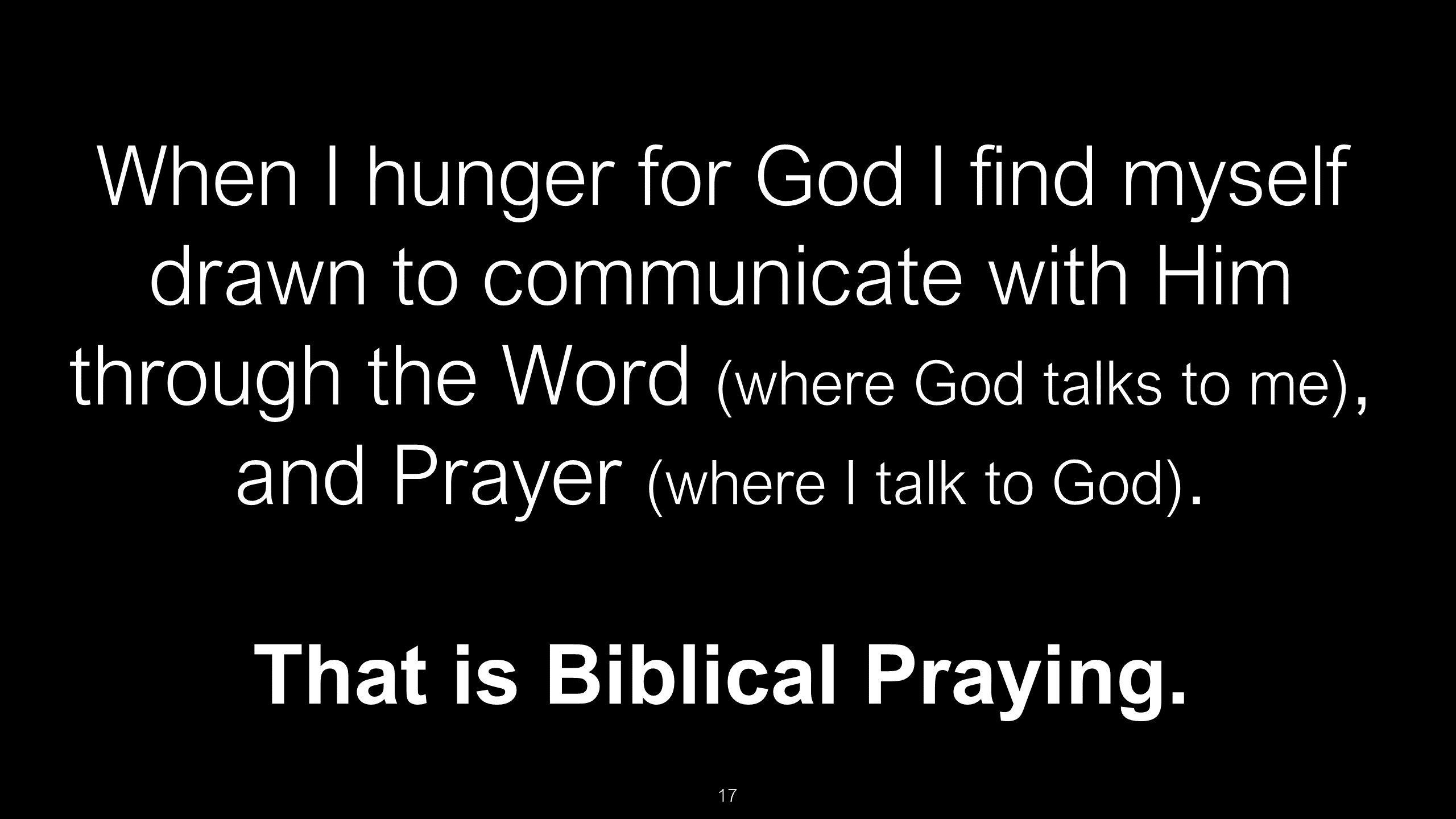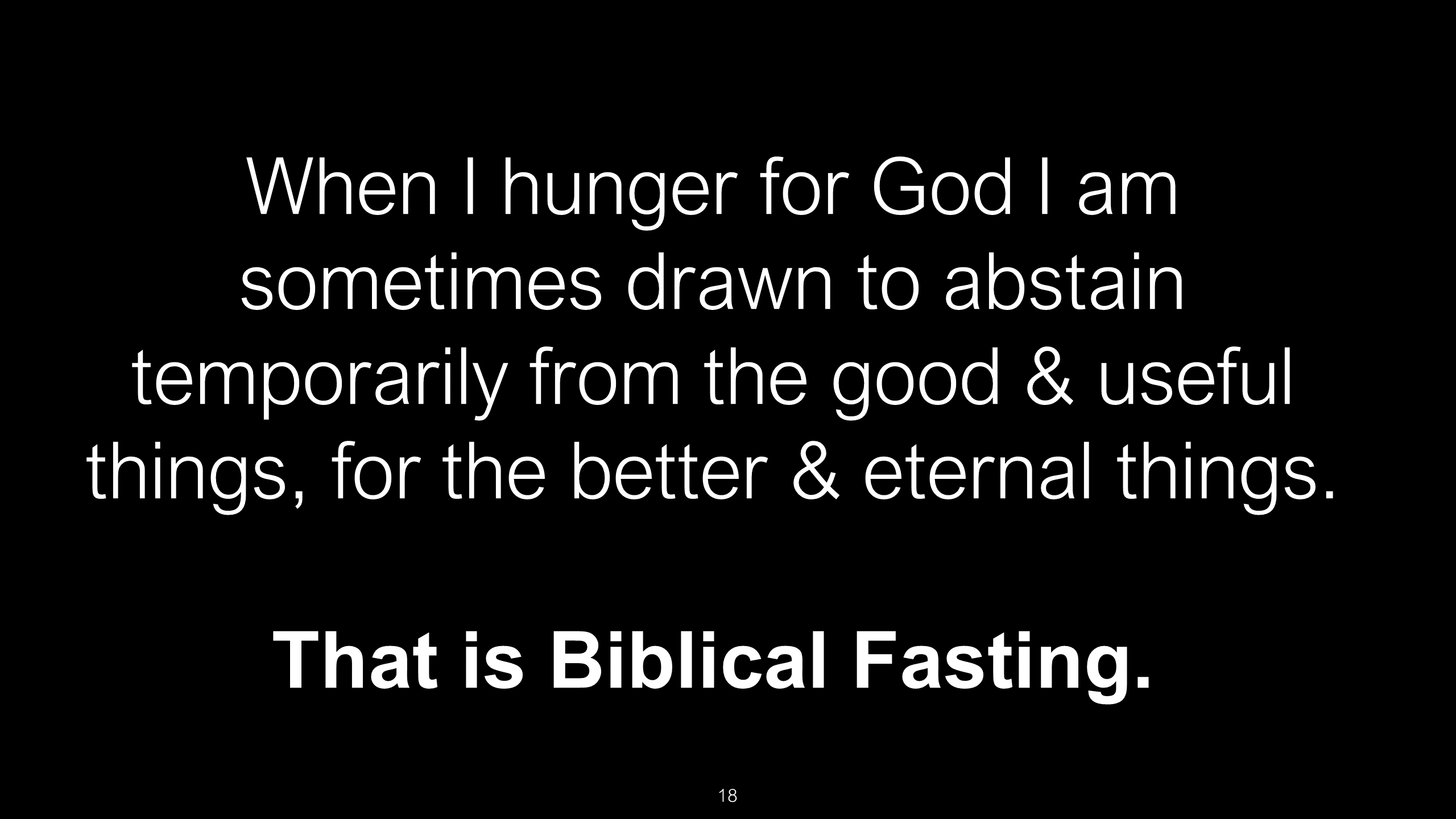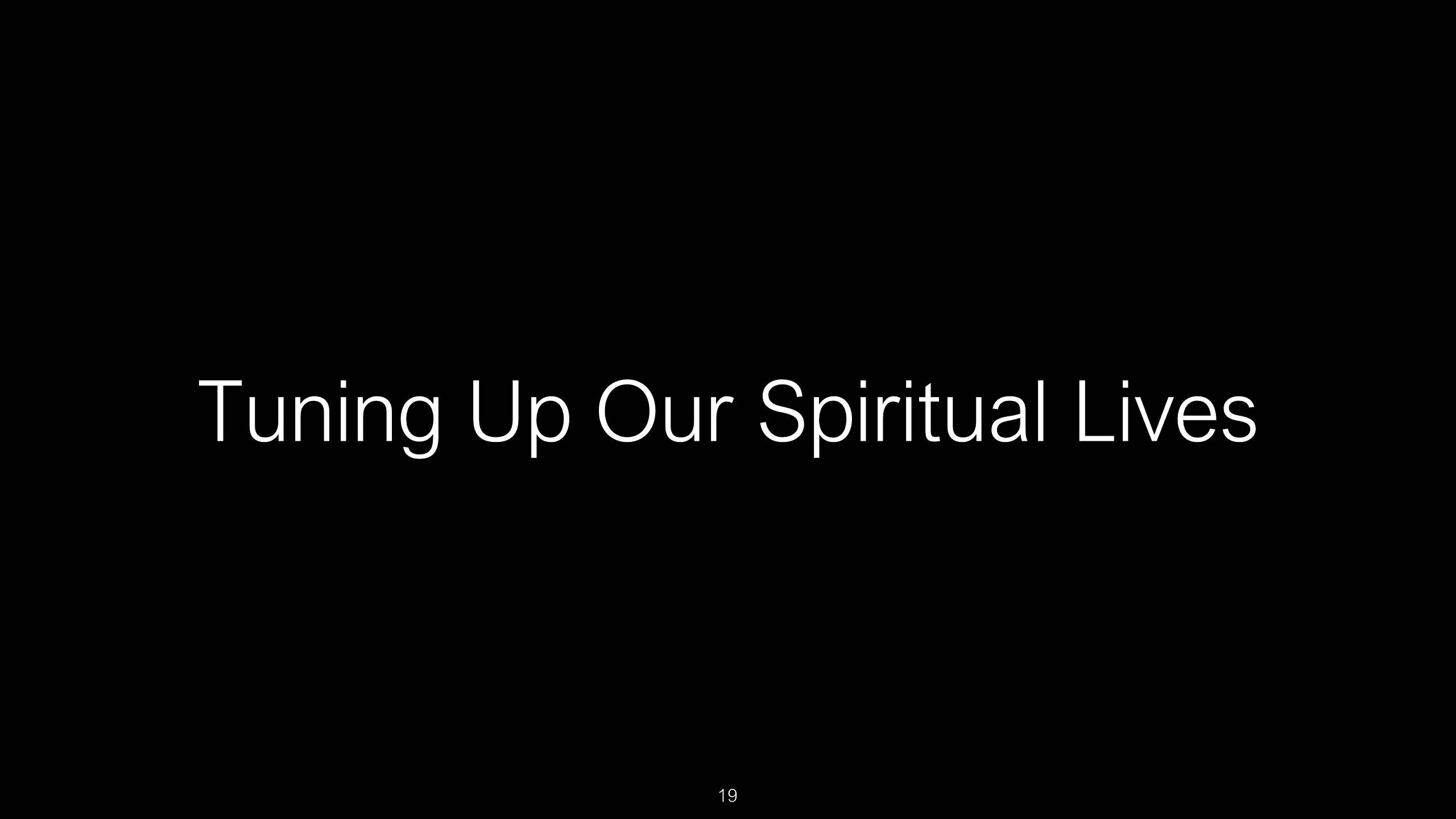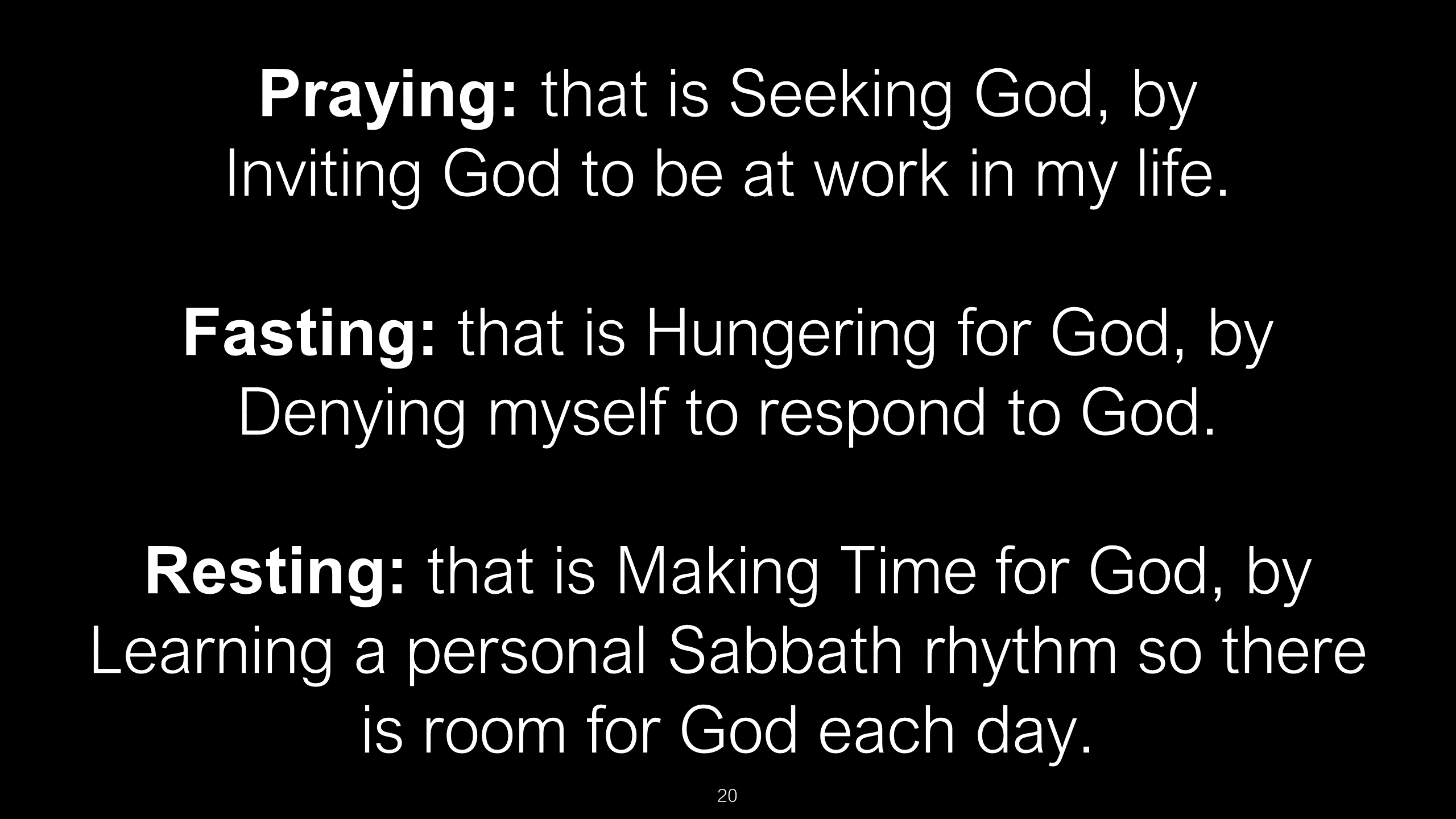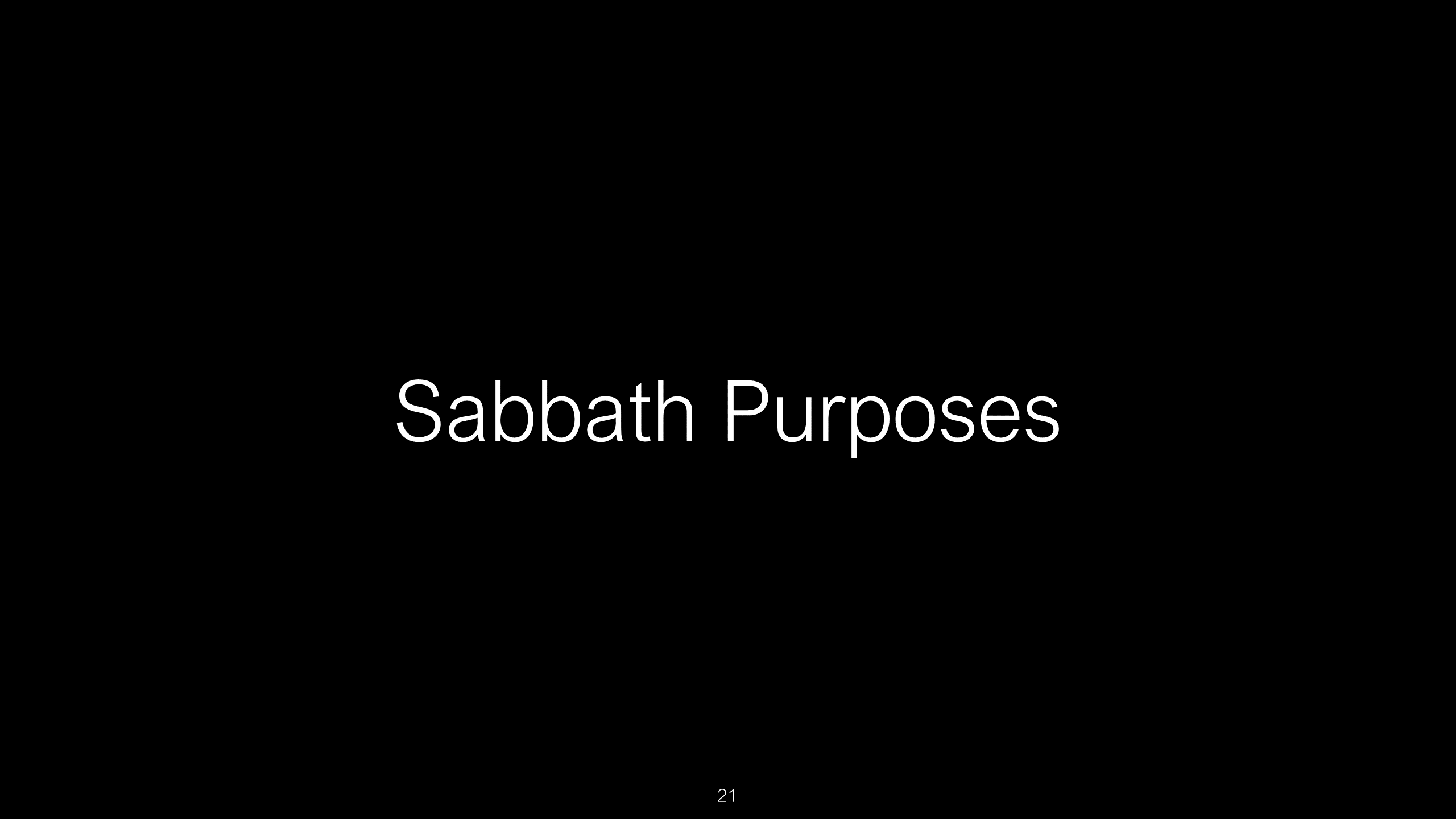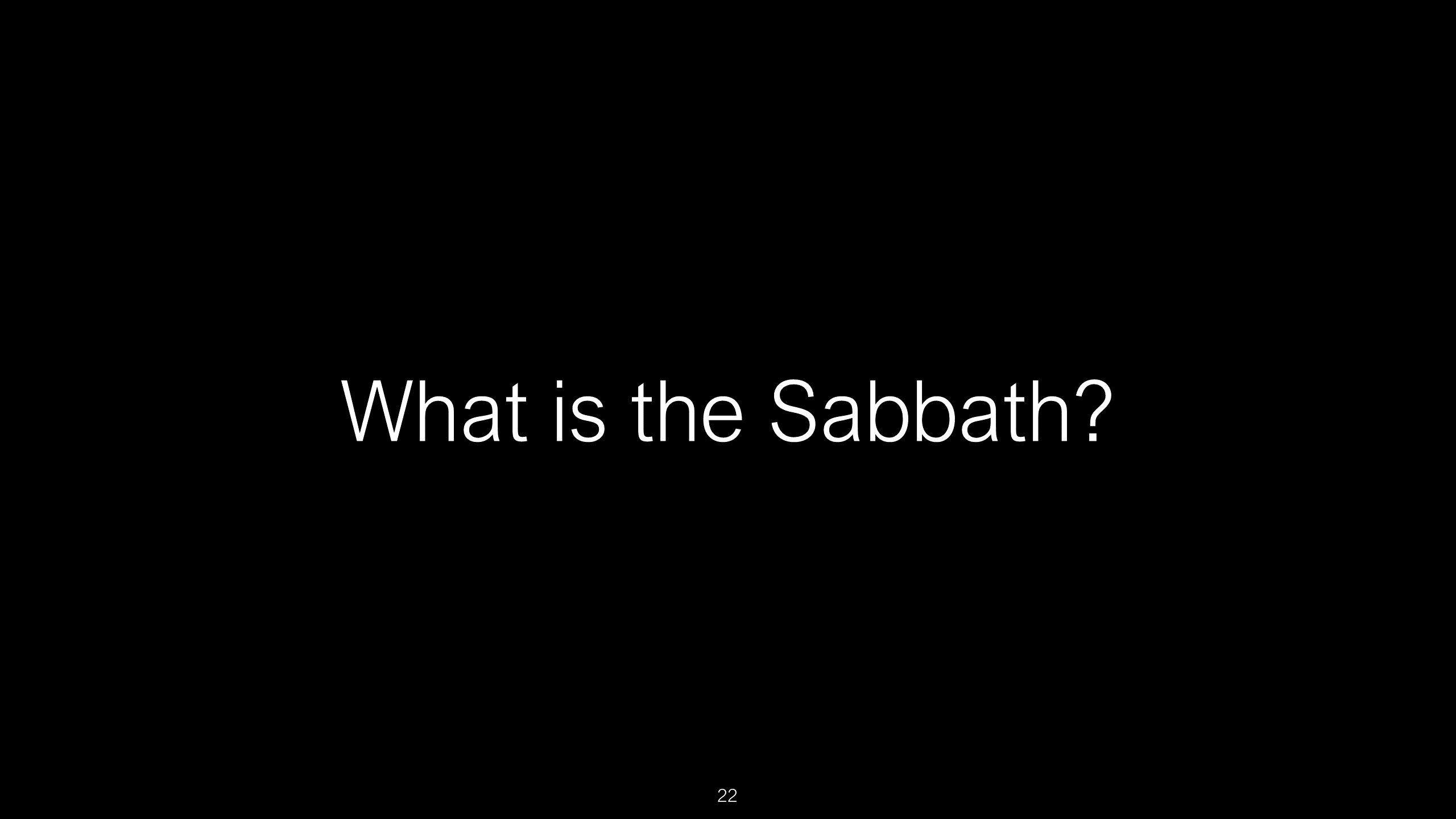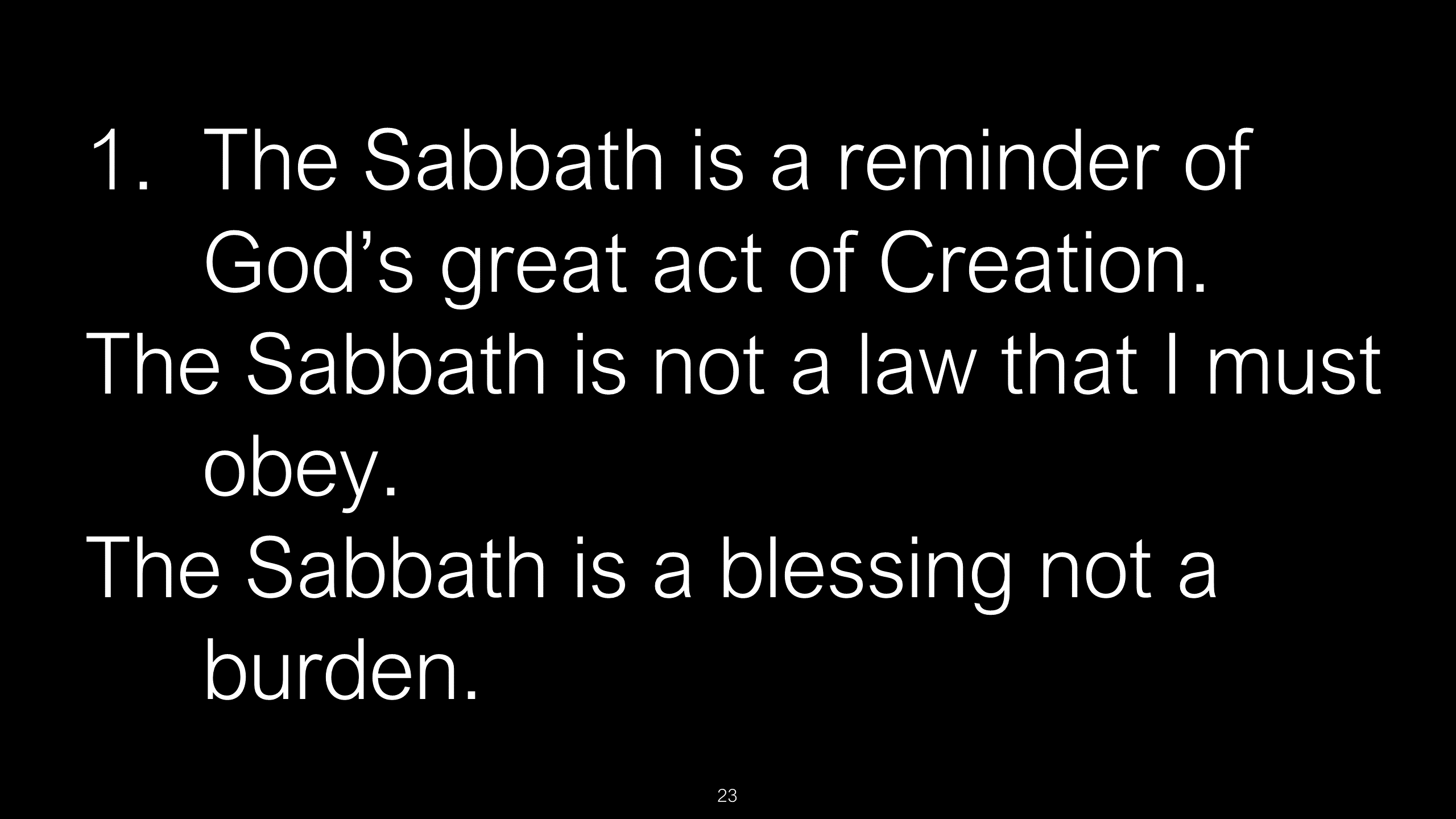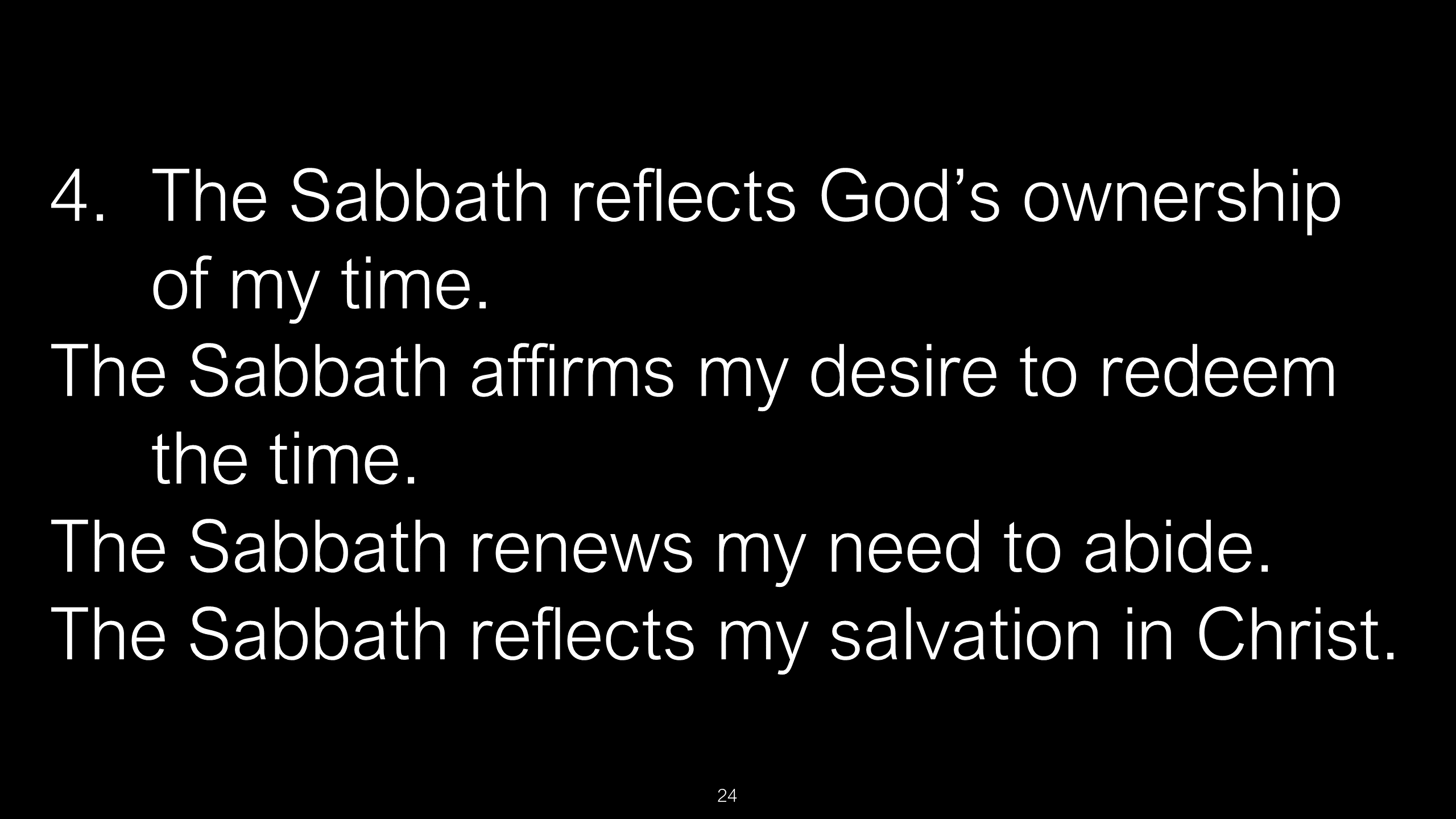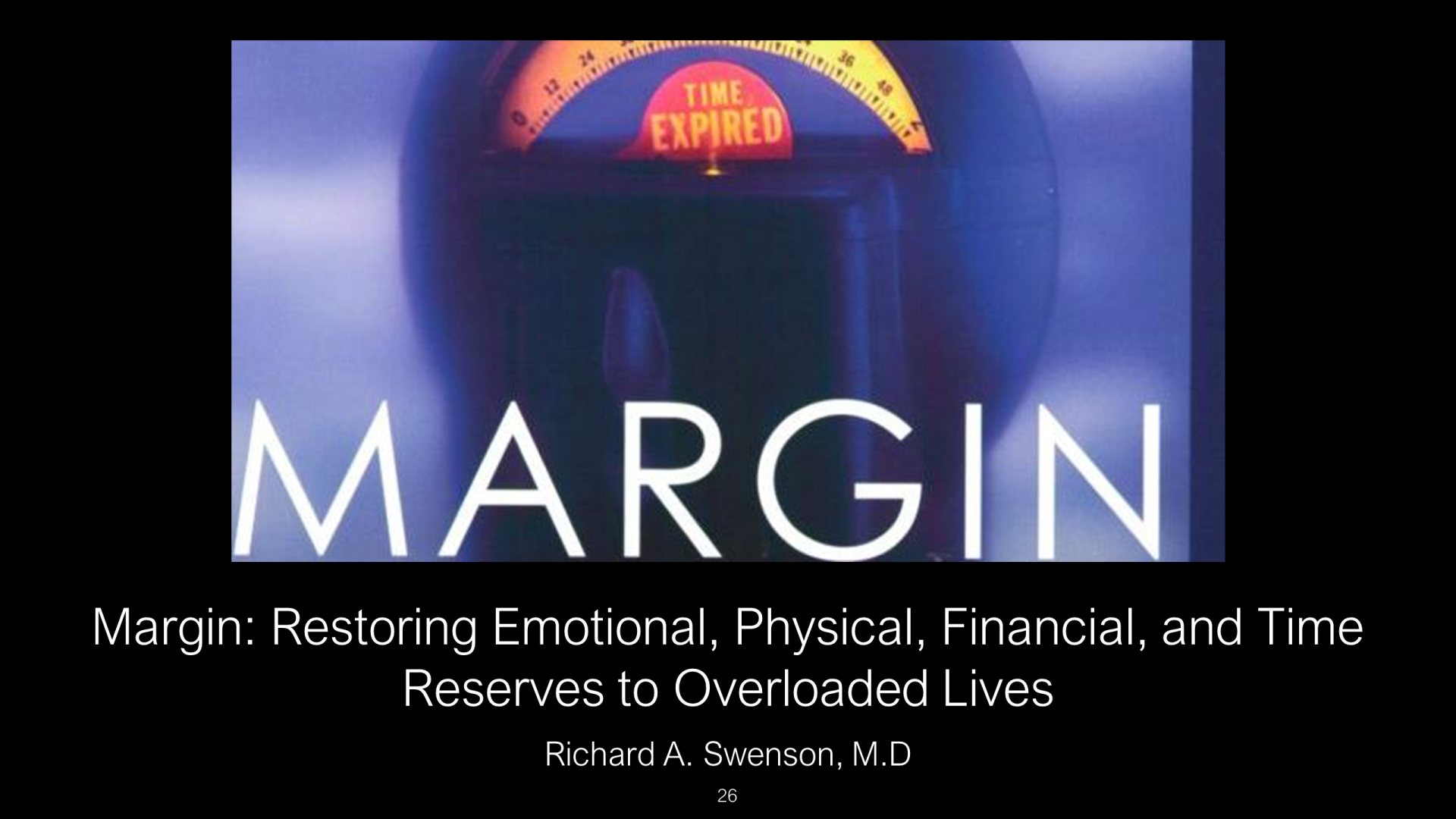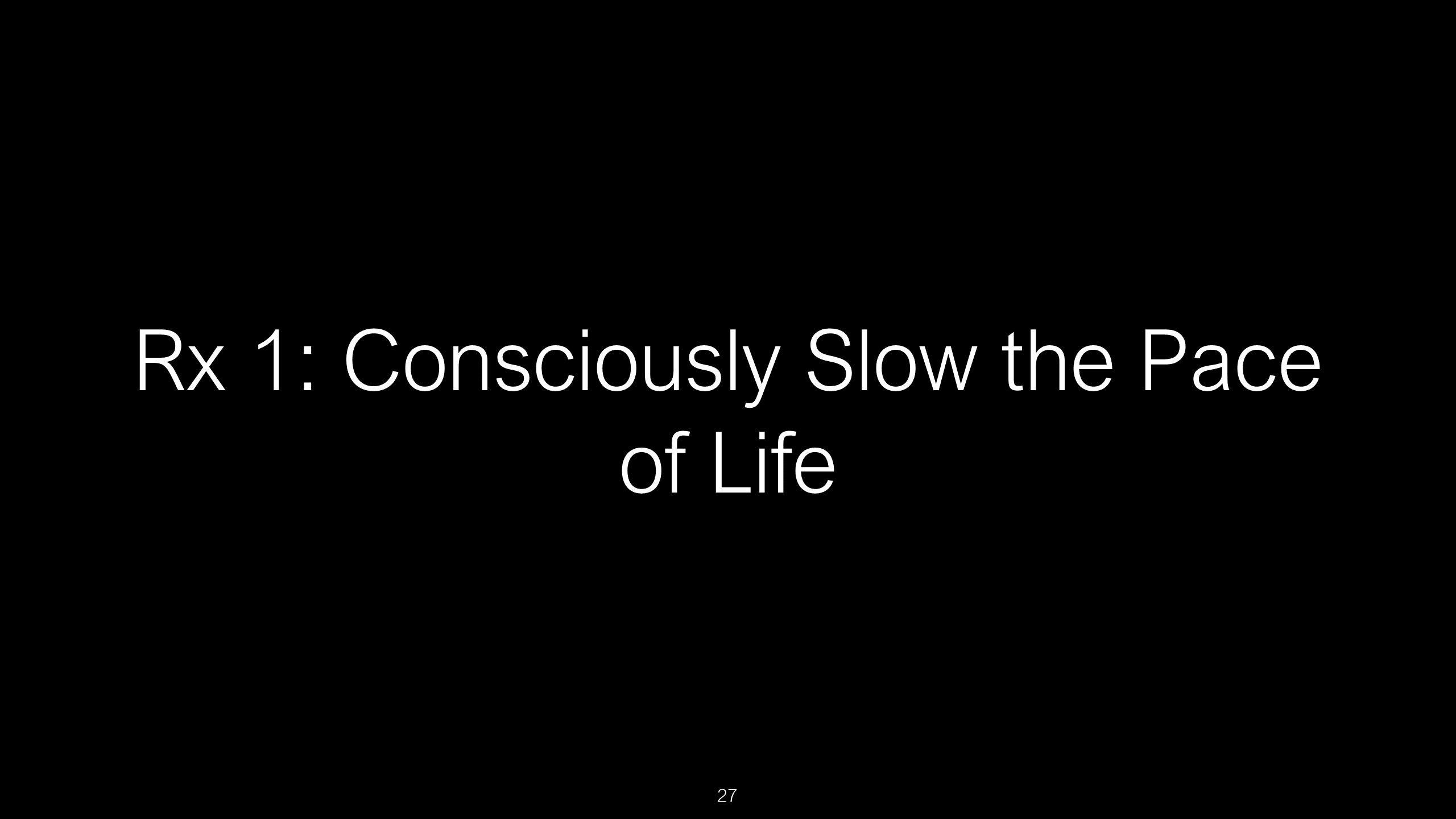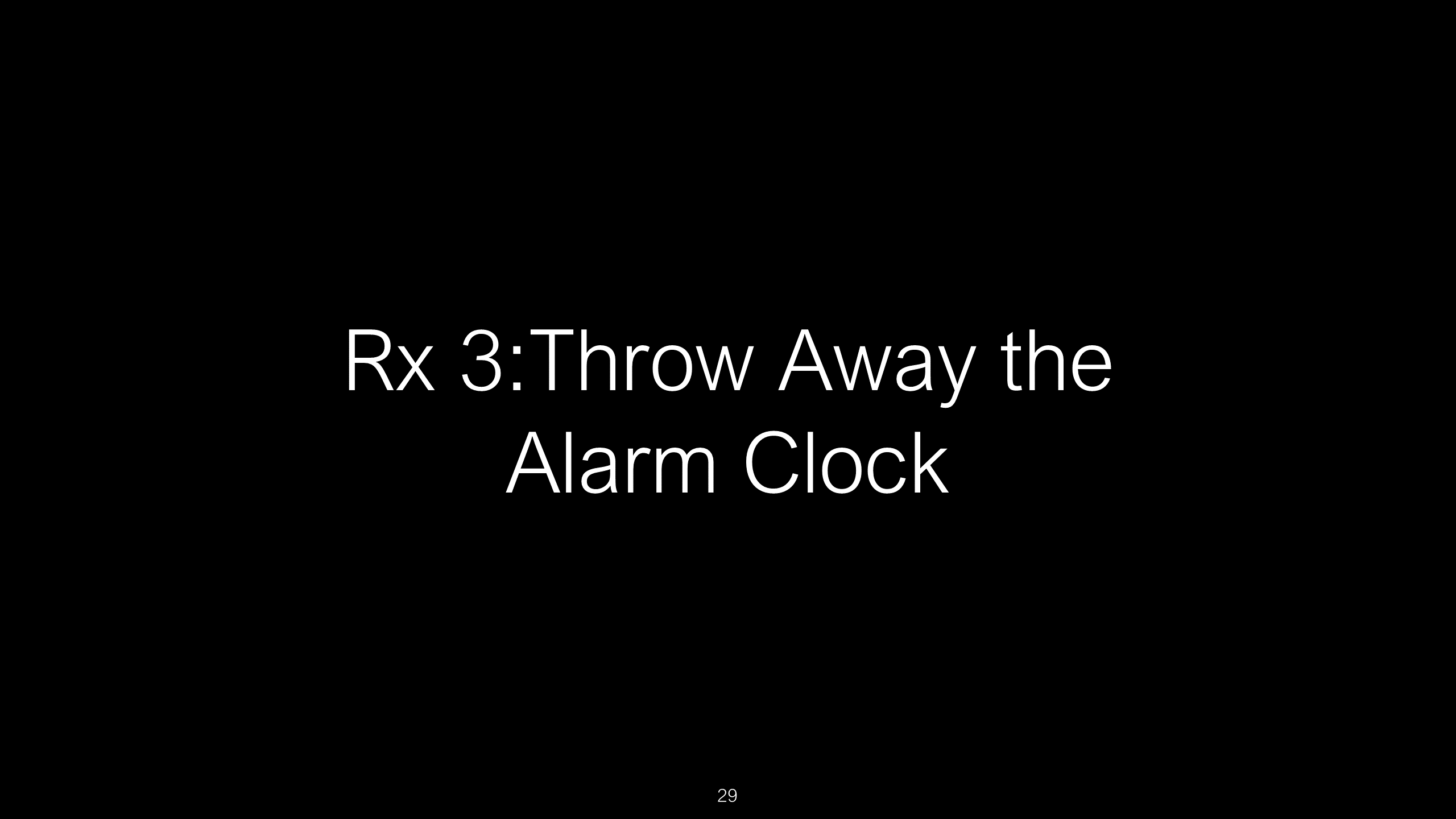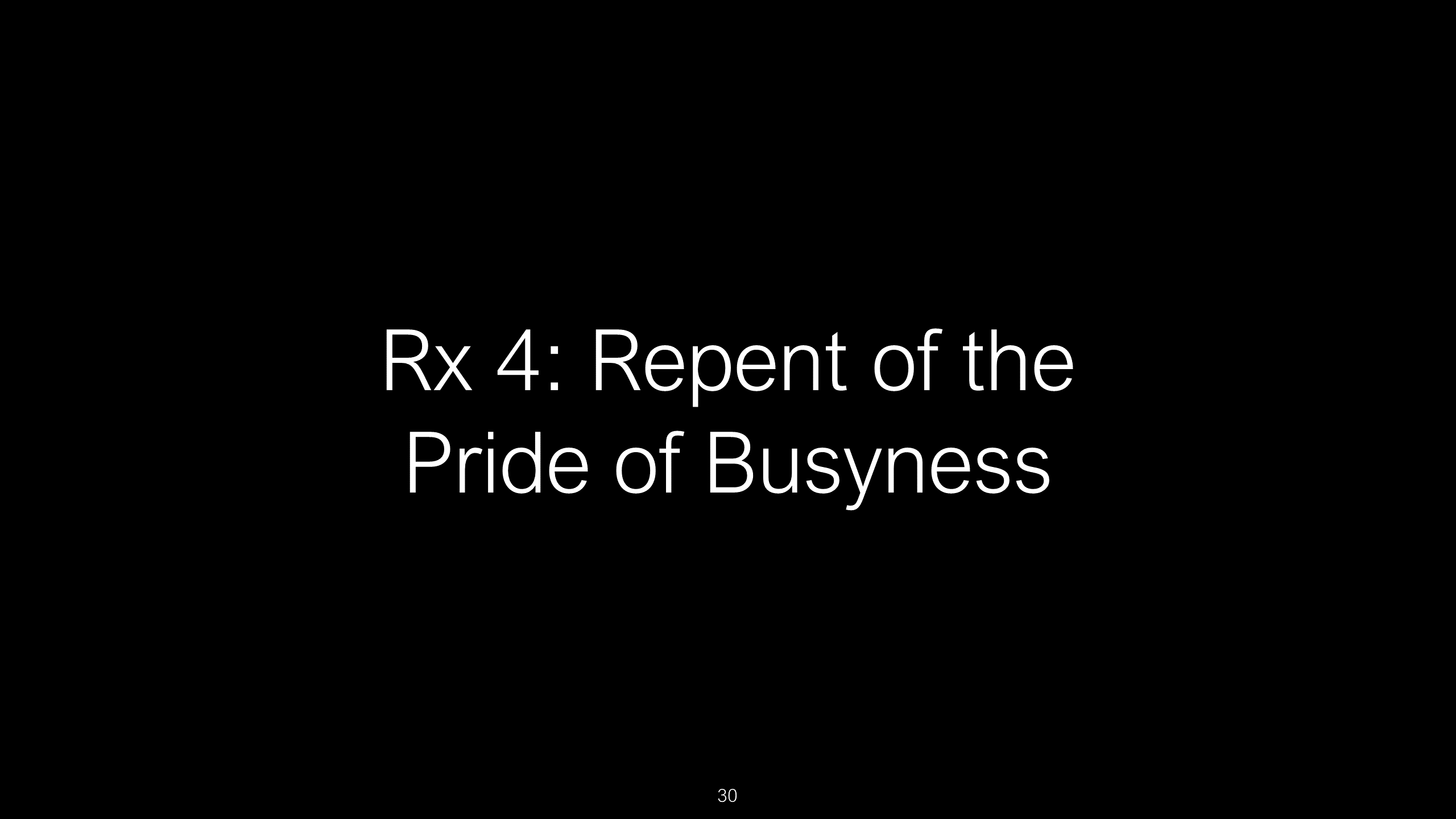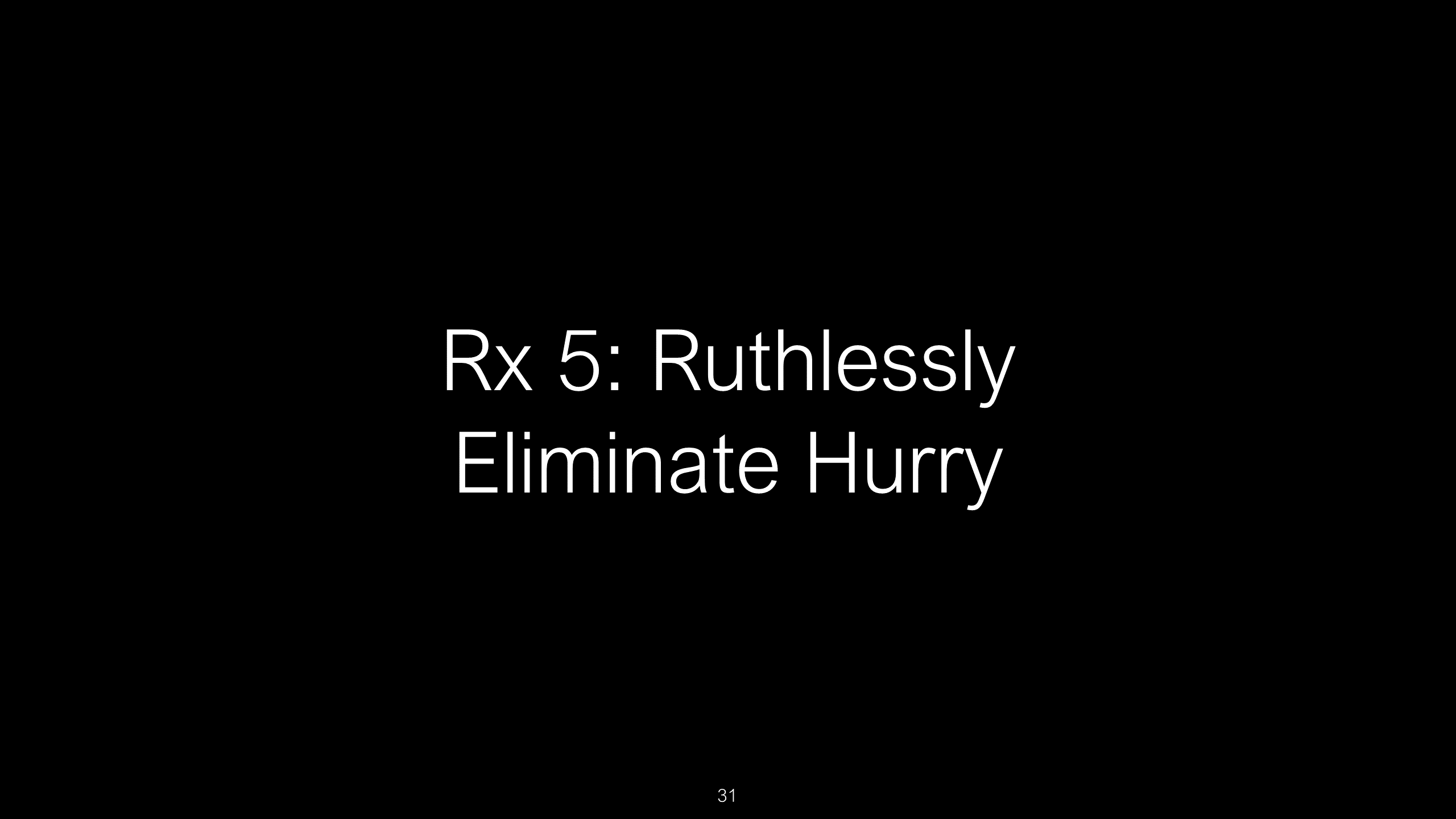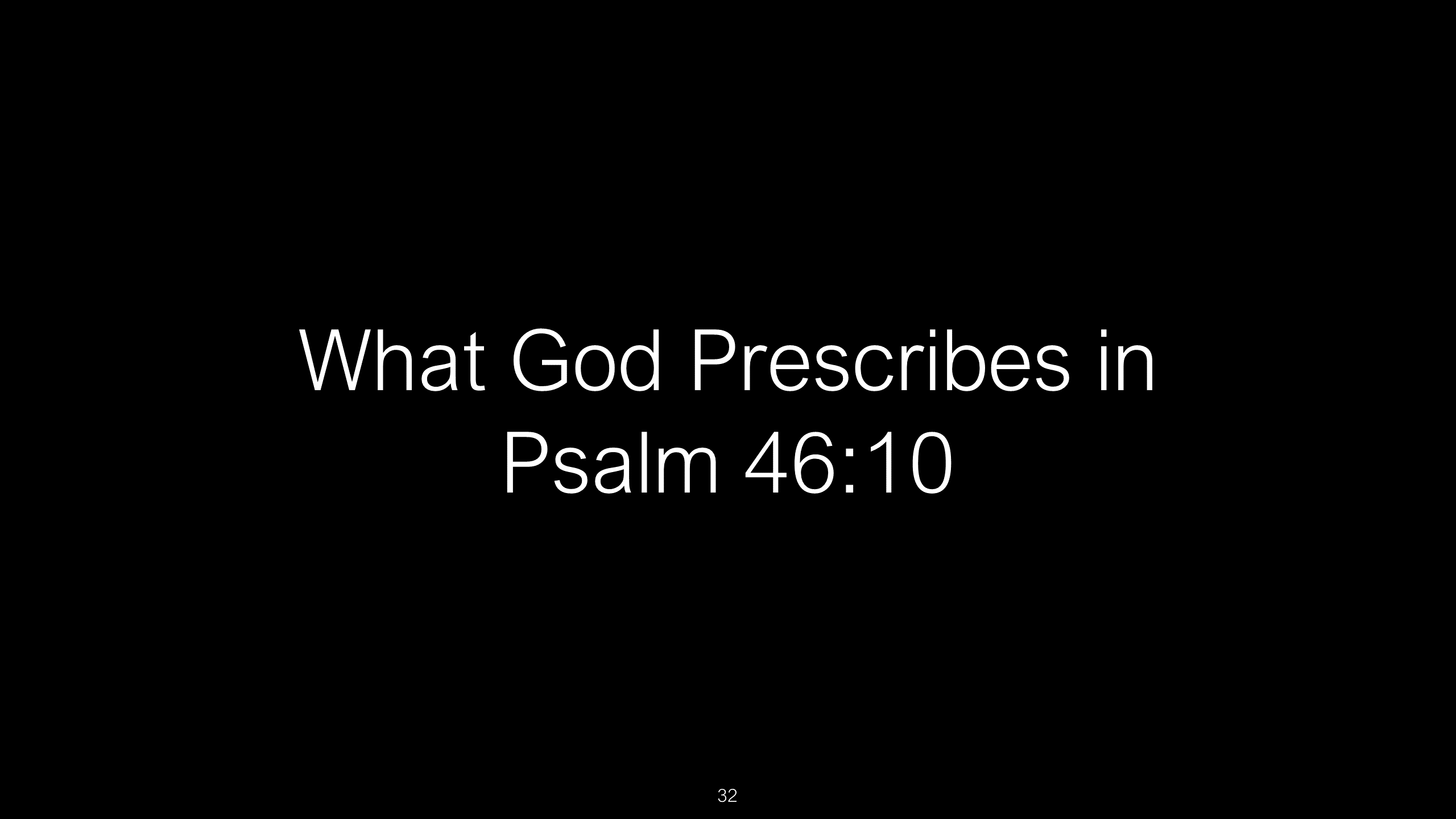If the YouTube video above is not available, here are two other ways to view:
150809AM HFG-13 Resting-5.docx
HFG-13
Sabbath Purposes: Reflecting God’s Ownership of My Time & Enjoying the Simplicity of God’s Rest
This morning we are turning to Isaiah 58, where we see two ancient and powerful truths applied by God Himself. This passage is God applying Biblical fasting and a personal Sabbath rest.
How’s Your Hunger For God Today?
Several weeks ago we began to study about Hungering for God and saw this longing after Jesus with a heart of love and devotion is called Biblical Fasting.
Biblical Fasting, or the voluntary abstinence from good and right things such as food, is a spiritual discipline, which has fallen upon hard times in modern Christianity.
So I repeat what we have learned:
In the Old Testament we can see that Biblical Fasting was an urgent call to get serious about Knowing God.
In the New Testament we see Biblical Fasting was an ancient spiritual discipline to reschedule my life with God at the center instead of dining, relaxing, amusing, accumulating, advancing, securing, and a multitude of other things that are not wrong – just deadly to intimacy with the Almighty.
In the Early Church of Acts and the Epistles we see demonstrated that this Hunger for God shaped their lives, their ministry, their worship, and their outreach.
In the Early Church we see Biblical fasting is a powerful way to yield every part of my life to God’s supremacy.
Conclusion: Biblical Fasting is an immediate way to declare your allegiance to God’s way and glory in every day of your life!
Isaiah 58:6-14 (NKJV)
“Is this not the fast that I have chosen: To loose the bonds of wickedness, To undo the heavy burdens, To let the oppressed go free, And that you break every yoke?
7 Is it not to share your bread with the hungry, And that you bring to your house the poor who are cast out; When you see the naked, that you cover him, And not hide yourself from your own flesh?
8 Then your light shall break forth like the morning, Your healing shall spring forth speedily,
And your righteousness shall go before you; The glory of the Lord shall be your rear guard.
9 Then you shall call, and the Lord will answer; You shall cry, and He will say, ‘Here I am.’
“If you take away the yoke from your midst, The pointing of the finger, and speaking wickedness, 10 If you extend your soul to the hungry And satisfy the afflicted soul,
Then your light shall dawn in the darkness, And your darkness shall be as the noonday. 11 The Lord will guide you continually, And satisfy your soul in drought, And strengthen your bones; You shall be like a watered garden, And like a spring of water, whose waters do not fail. 12 Those from among you Shall build the old waste places; You shall raise up the foundations of many generations; And you shall be called the Repairer of the Breach, The Restorer of Streets to Dwell In.
13 “If you turn away your foot from the Sabbath, From doing your pleasure on My holy day
, And call the Sabbath a delight, The holy day of the Lord honorable, And shall honor Him, not doing your own ways, Nor finding your own pleasure, Nor speaking your own words,
14 Then you shall delight yourself in the Lord; And I will cause you to ride on the high hills of the earth, And feed you with the heritage of Jacob your father. The mouth of the Lord has spoken.”
Pray
Now move down in your Bibles to v. 13, to the next topic God illustrates.
This final section of Isaiah introduces us to the Sabbath.
A Personal Sabbath = Reflecting God’s Ownership of My Time & Enjoying the Simplicity of God’s Rest
We have been examining the Sabbath Day from Creation Week, then Mosaic Law, then from Christ’s words in the Gospels. Over the next few weeks we will be looking at the following elements of understanding Biblical truths about the Sabbath:
Sabbath Purposes
What did Jesus say about the Sabbath?
As Lord of Sabbath He said one thing: The Sabbath was made for man to worship God. It was not a prison, a straight jacket, or a death squad to hunt Sabbath breakers; no, it was a delightful offer of spiritual communion with God.
Sabbath Promises
Do we need to rest and to cease from our wearying schedules?
Yes, and that is what this Old Testament picture teaches us New Testament saints! God offers rest!
Sabbath Laws
Should we really meet on Sunday or on the Sabbath Day, which is Saturday? What laws of God are still binding and what parts have passed away?
Sabbath Blessings
How do we apply personal Sabbath blessings to our lives?
How do we cultivate a rest, a cessation from weariness in our lives?
How do we make worship of the Lord special on our Day of Gathering, the Lord’s Day?
Sabbath Thieves
What takes away the blessings and promises of the rest God offers? This section is an examination of what robs us of the blessings of a personal Sabbath rest. A Personal Sabbath Rest:
Helps us root out the contamination of the media;
Helps us root out the contamination of superficiality in our culture;
Helps us counter the claims we are required to worship on the Sabbath day;
Helps us repent of the pride of busyness;
Helps us “ruthlessly eliminate hurry”
Sabbath Plans
What are some simply wonderful plans we can make to heighten our worship, and communion with God?
Some real blessings can come with some small changes and some preparations.
Sabbath Pictures
What are the illustrations that Jesus, His apostles, and all the Old Testament saints used to show the plan of God?
Those plans God left are God’s Holidays, the Sabbath Feasts.
Each Old Testament holiday is a wonderful picture and pathway to deepening our devotion to Jesus.
Sabbath Rest
What does God want more than anything? Our minds.
What is the key to our spiritual success? A mind that rests upon and is fixed upon the Lord God Almighty!
Are We Hungering for God Today?
When I hunger for God it is displayed in three areas of my life.
When I hunger for God I find myself drawn to communicate with Him through the Word (where God talks to me), and Prayer (where I talk to God).
That is Biblical Praying.
When I hunger for God I am sometimes drawn to abstain temporarily from good and useful things for the better and eternal things.
That is Biblical Fasting.
How would you like to tune-up your spiritual life? God has left three basics that always spur spiritual growth. They are the elements that reflect our Hunger for God.
Tuning Up Our Spiritual Lives
Praying: that is Seeking God. Inviting God to be at work in my life.
Fasting: that is Hungering for God. Denying myself to respond to God.
Resting: that is Making Time for God. Learning a personal Sabbath rhythm so there is room for God each day in our lives.
Making time for God is what we long for the more we know Him and love Him. Just as the whole law is fulfilled by love, so we see in that 4th command that the Sabbath reminds us that love demands intimacy.
If you love someone you seek that closeness that no one else can have. When we love God, He wants us to give Him a closeness in our lives that nothing else and no one else can ever have. He is most precious. He is most desires. We are always looking for ways to spend time with Him.
First, what did Jesus say about the Sabbath?
As Lord of Sabbath He said one thing: The Sabbath was made for man to worship God. It was not a prison, a straight jacket, a death squad to hunt Sabbath breakers; no, it was a delightful offer of spiritual communion with God. That is what we can call:
Sabbath Purposes
Considering a personal Sabbath rest heightens the paradox we see in Christ’s life.
Jesus labored to exhaustion, yet He never ceased to rest in God, God’s Word, and God’s plan.
Jesus said that the Sabbath was made for mankind.
It is a gift from God to rest our wearied, frantic, stretched-too-thin lives, but it is a choice, not a command.
Jesus lived the perfect life, accomplished more than any human ever did, and yet Jesus was never in a HURRY!
He was Purposed but never PUSHED.
He was focused but never FRANTIC.
He was Resolved but never RUSHED!
Did you notice this week the pace of your life? How does the increasingly overwhelming speed of life impact us as we come here to worship God?
The essence of a godly life and home is the spiritual condition of the occupants. Where are you today?
God’s Word can challenge all of us in this study by examining what we are really doing when we live such hurried lives. In the days ahead we will see some truths about resting in God that are reflected in the concept of a personal Sabbath rest intentionally chosen in our lives.
What is the Sabbath?
The New Testament Sabbath is God inviting us to set aside time with Him because we love Him. Looking to the days ahead as we dig into the Scriptures, let me just share my conclusions with you.
- The Sabbath is a reminder of God’s great act of Creation. Sabbath observance was not stated anywhere in the creation account in Genesis 1-2. But, in Exodus, Ezekiel and Nehemiah the Sabbath Day is stated to be a sign to Israel, not to the Church.
- The Sabbath is not a law that I must obey. The New Testament teaches that all the Old Testament rules regulating Sabbath Day behavior were part of the ceremonial law that God gave to Israel. The moral law is repeated in the New Testament and is binding upon all believers of all ages; but the ceremonial law is not repeated in the New Testament and is not binding upon New Testament believers. The system of sacrifices, the system of a Levitical priesthood, and all the elements of the ceremonial law system including Sabbath Day behavior, passed away when Christ came to bring the New Covenant.
- The Sabbath is a blessing not a burden. So the Sabbath Day has blessings, but an unbiblical observance leads to bondage. That is what we will see in the days ahead. God wants us to understand the Sabbath rest He has given both in salvation and in our rhythms of life.
- The Sabbath is a reflection of God’s ownership of my time. Thus it is not a day we observe, but an attitude that flows from a relationship. It has nothing to do with shopping, traveling, or activities; and everything to do with knowing God, longing for His Word, and delighting in His His Presence. 1 Cor. 6:19-20
- The Sabbath is an affirmation of my desire to redeem the time. Our time investments as New Testament believers should show a conscious move away from endless time invested in work for physical profit, and growing choices for regular time invested in knowing God better each day. Ephesians 4
- The Sabbath is a conscious renewal of my need to abide. Sabbath observance becomes a daily lifestyle of enjoying moments of resting in Christ. Any temporary daily cessation from work is primarily to open time for reflecting our desires for intimacy with our Savior and Creator. We don’t live to work every moment, we live to know Christ and work hard to fulfill our Biblical responsibilities in life.
- The Sabbath is a reflection of my salvation in Christ. In the Epistles Paul explicitly says that the Old Testament ceremonies were shadows of Christ that are past, now that He has come (Gal. 4:10-11; Col. 2:16-17). When Paul wrote about sins to avoid, he never stated sins of not observing the Sabbath, rather he stated the opposite. Paul says beware of Sabbath observance that leads to bondage.
How do we transition into the slower traffic lane of life if we are speeding today? A gifted medical doctor wrote an amazing book 17 years ago that has become a best seller and spawned 8 other books. I have read this first book Margin, several times as well as some of the sequels.
This book is worth reading for any stage in life.
The essence of this book is prescriptions for dealing with hurried life.
Or more simply what Dr. Swenson calls:
Prescriptions[1] For Healing The Hurry Sickness
As the world around us accelerates, our energies wane.
But we are not defenseless victims.
The following suggestions will help replace frenzy with the blessings of a Sabbath rhythm which offers, in Christ, both peace and rest.
Rx 1: Consciously Slow the Pace of Life
I recently saw a T-shirt that read: “It’s not the pace of life that worries me. It’s the sudden stop at the end.”
After contemplation, I decided the exact opposite is true. “The sudden stop at the end” means a home going that, quite frankly, I look forward to. But the pace of life is deadly!
Is it possible to consciously slow our pace? Of course it is. We just have to say no more often. It is not easy, but it is necessary–and it is right.
Every year the world spins faster. So put on the brakes and obey the speed limit of your soul.
The green pastures and still waters yet await us—but not in the direction the treadmill is spinning.[2]
Rx 2: Make Technology Work for You and Not against You
Remember: Timesaving technologies don’t save time. Instead, they compress and consume time. Recognizing that technology is responsible for much of our time-urgency problem, it is appropriate to be skeptical.
Always make technology work for you and not against you. If you can’t control it, don’t trust it. “The high-tech world of clocks and schedules, computers and programs, was supposed to free us from a life of toil and deprivation,” explains technology critic Jeremy Rifkin in Time Wars, “yet with each passing day the human race becomes more…exploited and victimized.”[3]
Rx 3:Throw Away the Alarm Clock
Psychiatrist Paul Meier provocatively asserts, “If you wake up to an alarm every morning, there is a good chance that you are out of the will of God.” Radical thinking!
But he is simply trying to shock us into rethinking the will of God in light of the original equipment provided at creation. An alarm clock was not a part of the package. Instead, God caused our bodies generally to wake up when we have had enough sleep.
Now, however, that natural process never gets a chance to complete itself.
Rx 4: Repent of the Pride of Busyness
The busier we appear, the greater the respect afforded us. While the person sitting on a lawn swing is scorned, the speed-of-light jet jockey is venerated.
“The clock dictates the tempo of our lives,” explains Mayo Gilson, M.D. “We all hurry, involving others in our hurry. Paradoxically, we point at our lack of time with a certain pride, as if that lack has something to do with our importance as a person. [4]
There is a trap here, and pride is its name. Before we can slow down and allow God to set things right in our hearts, we have some confessing to do. It is not busyness that we should honor in our midst, but love.
Busyness and love are not the same. One is speed; the other is God.
Rx 5: Ruthlessly Eliminate Hurry
When John Ortberg moved from California to Illinois to assume a position at the rapidly growing Willow Creek Community Church, he first asked a wise mentor for advice. “You must ruthlessly eliminate hurry from your life,” said his friend. Ortberg wrote down the advice and then waited for the next suggestion. “There is nothing else,” explained the sage.[5]
Three aspects of this truth strike me: How simple it is, how difficult it is, and how ruthless it is. Ruthless is indeed the best word to use in this context, because no other degree of intention is sufficient to accomplish such a goal.
What God Prescribes in Psalm 46:10
Writing in the early 1960s, A.W. Tozer diagnosed a lack of reverence in the church. In the opening pages of The Knowledge of the Holy, he wrote, “The words, ‘Be still, and know that I am God,’ mean next to nothing to the self-confident, bustling worshipper in this middle period of the twentieth century.” In those fifty-plus years since Tozer wrote those words, the irreverence of the church has only worsened.
NKJV, NIV & ESV
Be still, and know that I am God; I will be exalted among the nations, I will be exalted in the earth!
New American Standard Bible (NASB)
Cease (Let go, relax) striving and know that I am God;
[1] Richard A. Swenson, M.D., The Overload Syndrome. Colorado Springs, Colorado: NAVPRESS, 1998, p 123-33.
[2] Psalm 23:2
[3] Jeremy Rifkin, Time Wars: The primary Conflict in Human History (New York, NY: Simon & Schuster, 1987), pp. 223-224.
[4] Mayo D. Gilson, “Redeeming the Time,” News and Reports-CMS,March/April 1988, p. 81.
[5] John Ortbert, The Life You’ve Always Wanted: Spiritual Discipines for Ordinary people (Grand rapids, MI: Zondervan, 1997), p.81.

